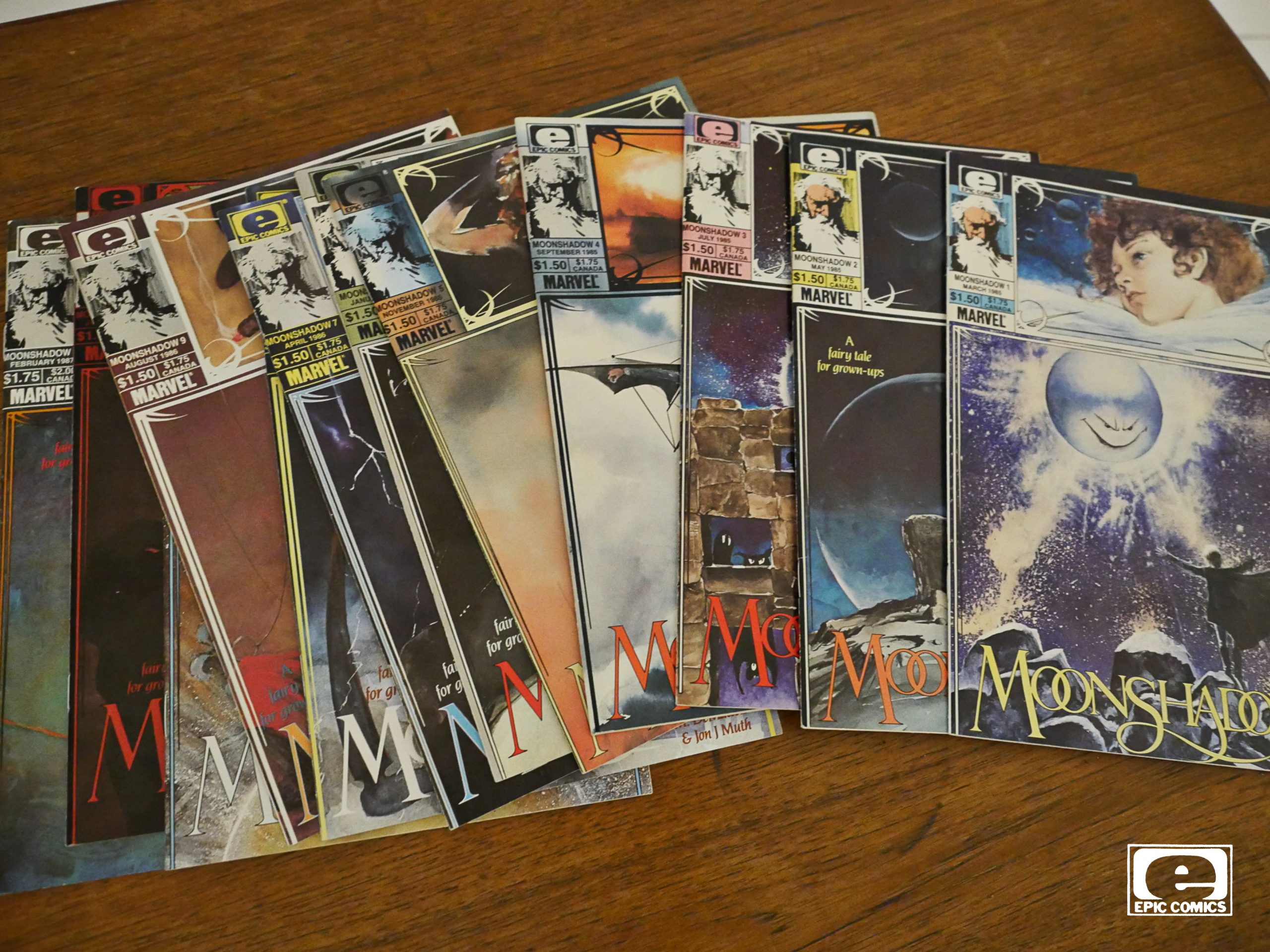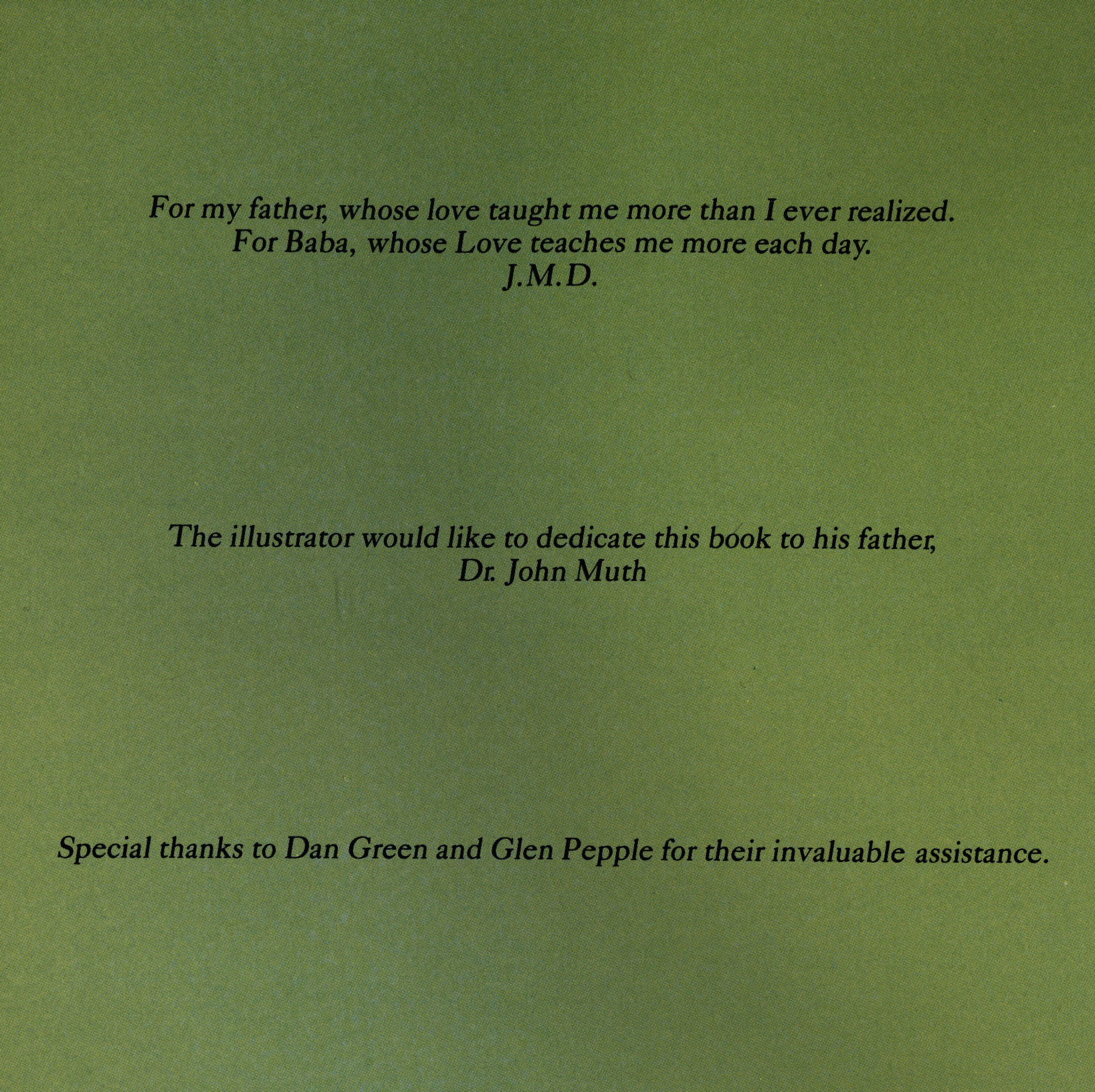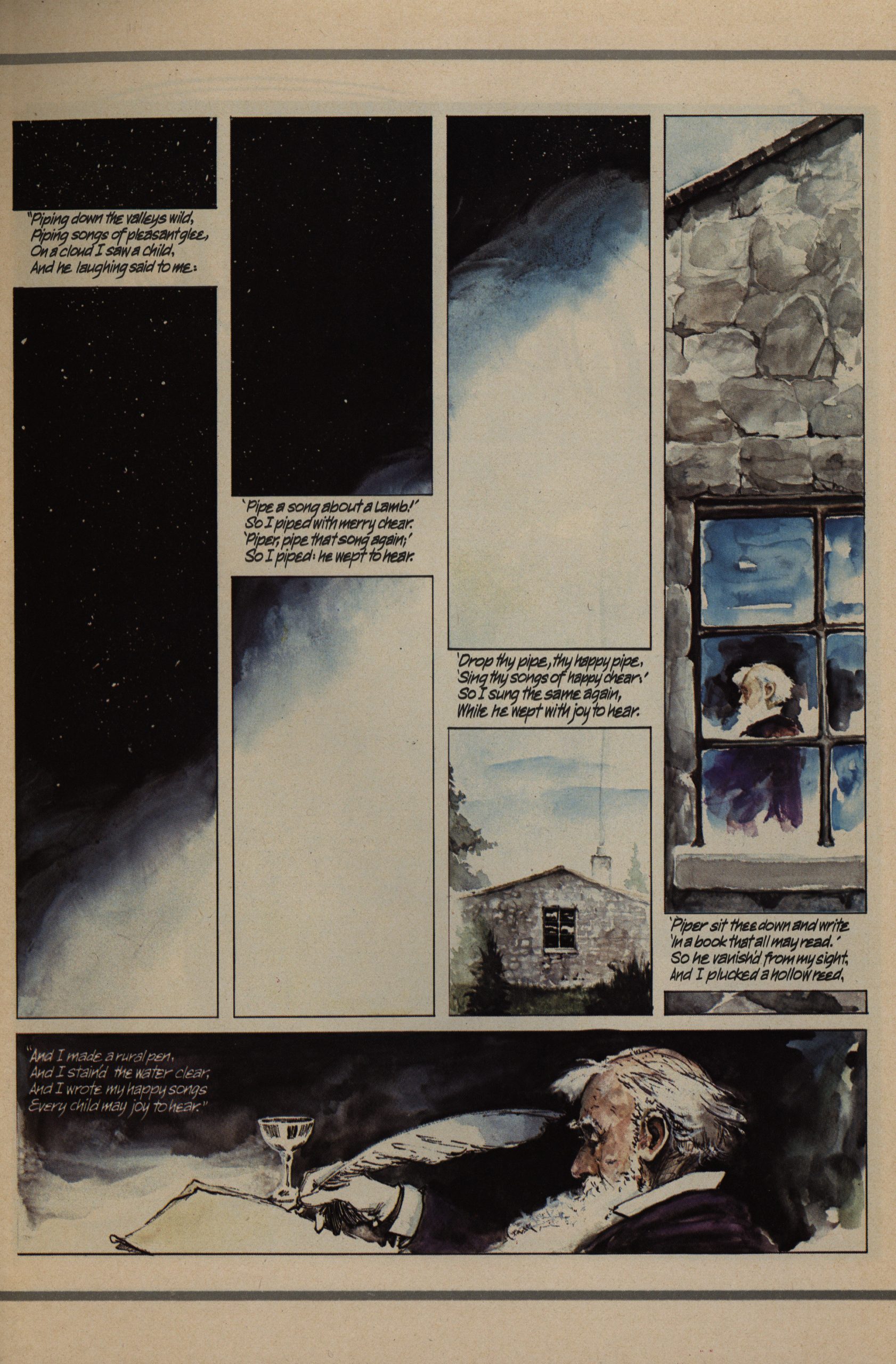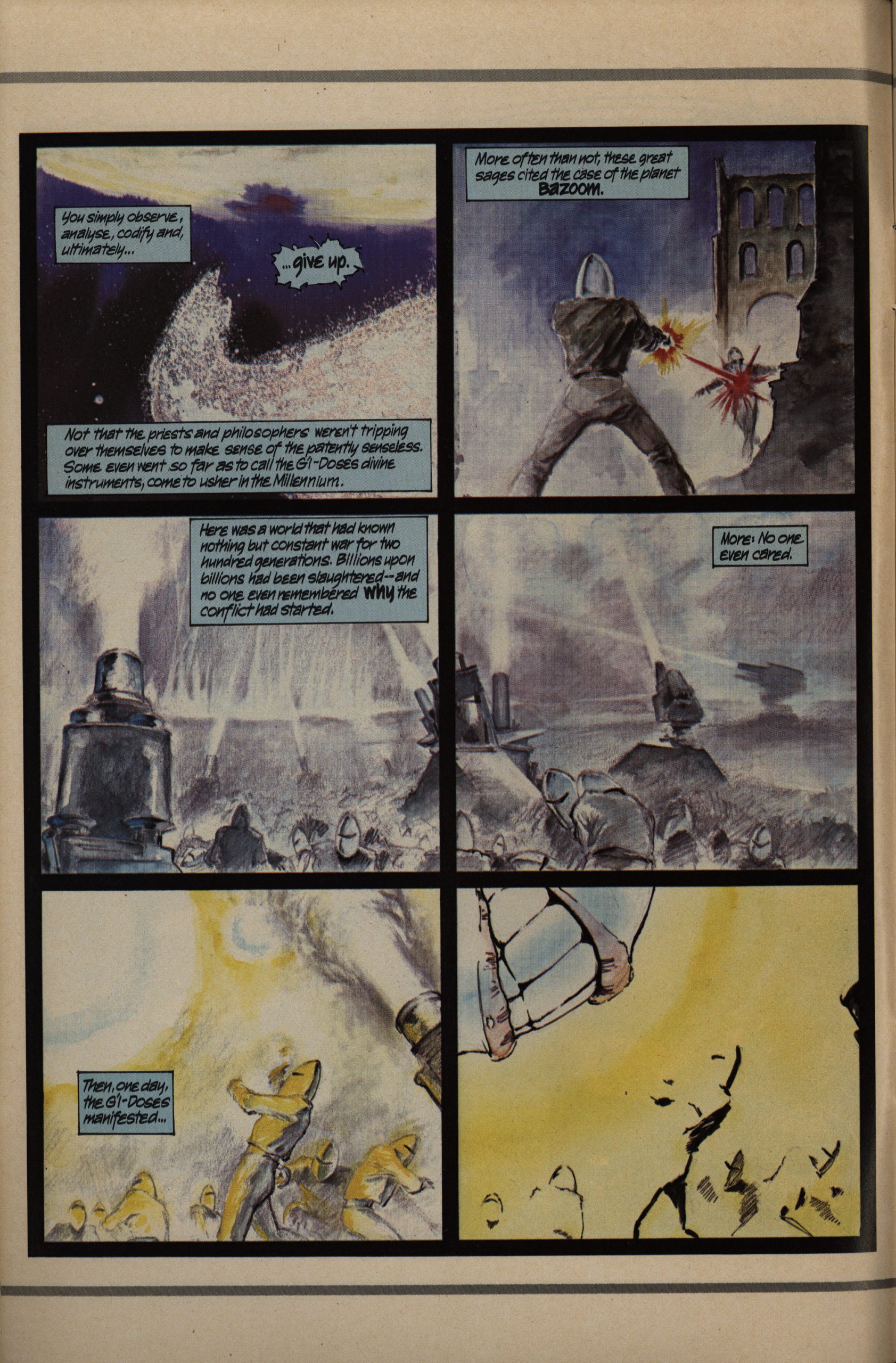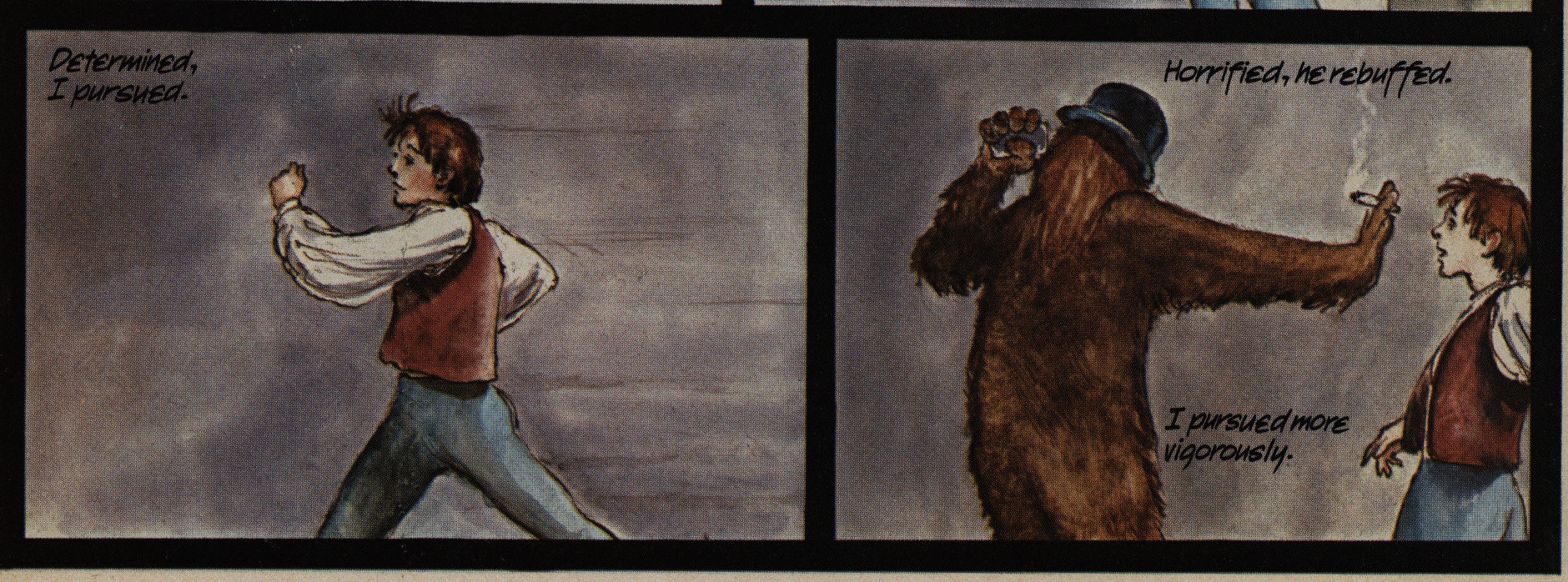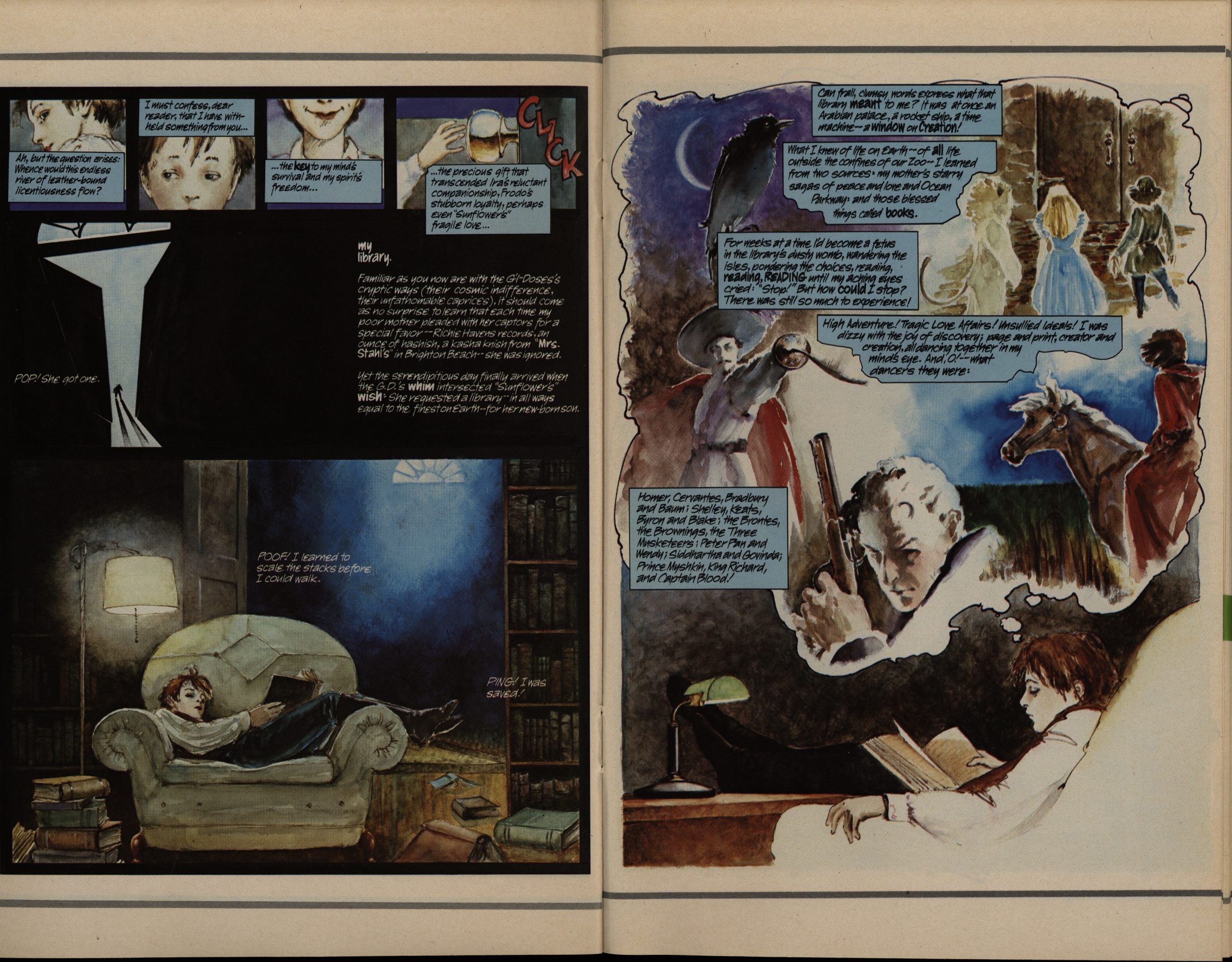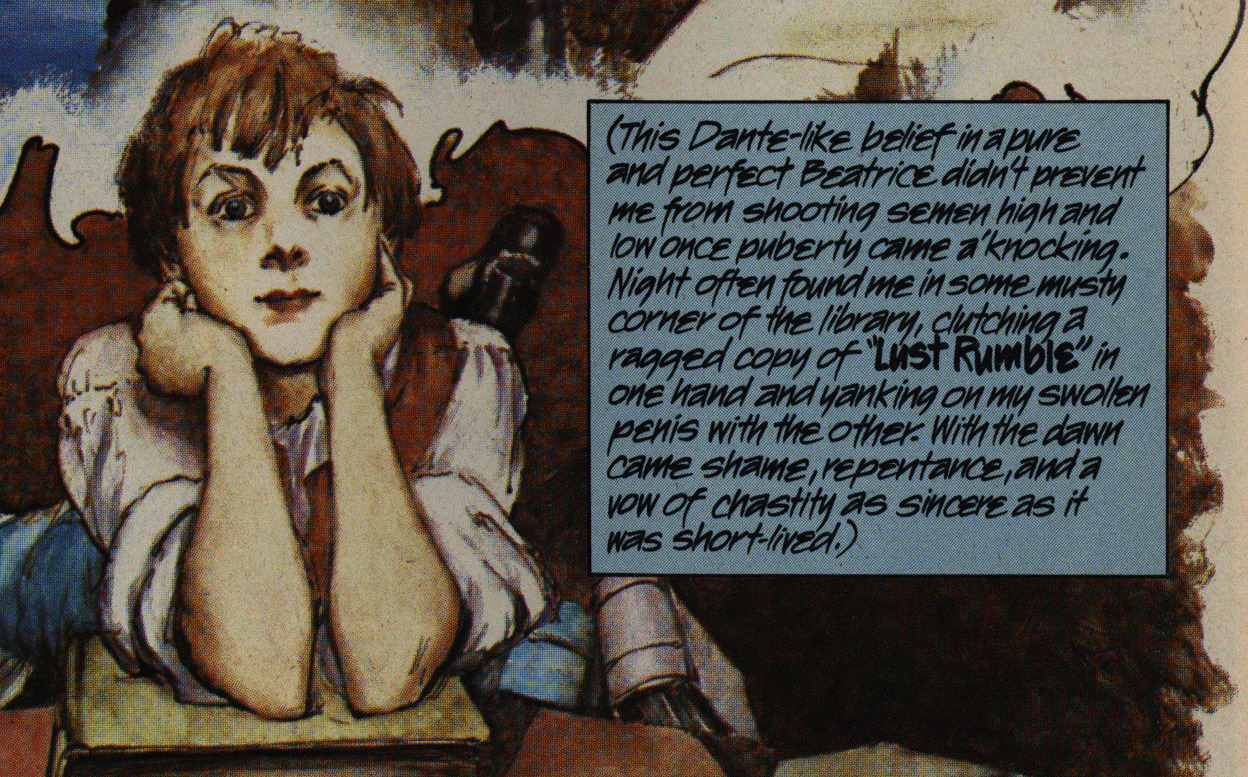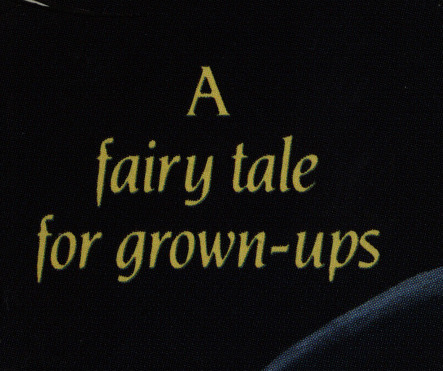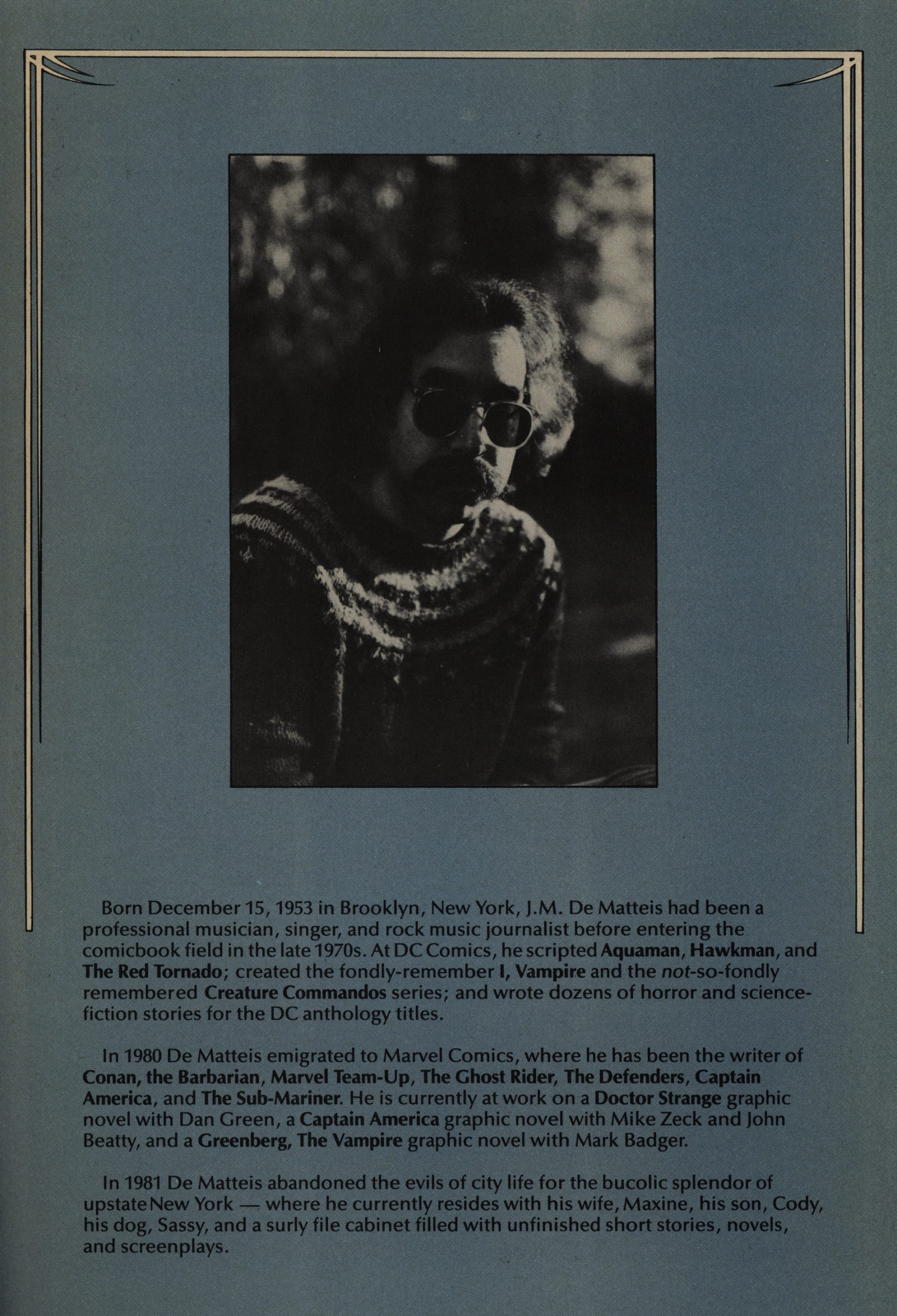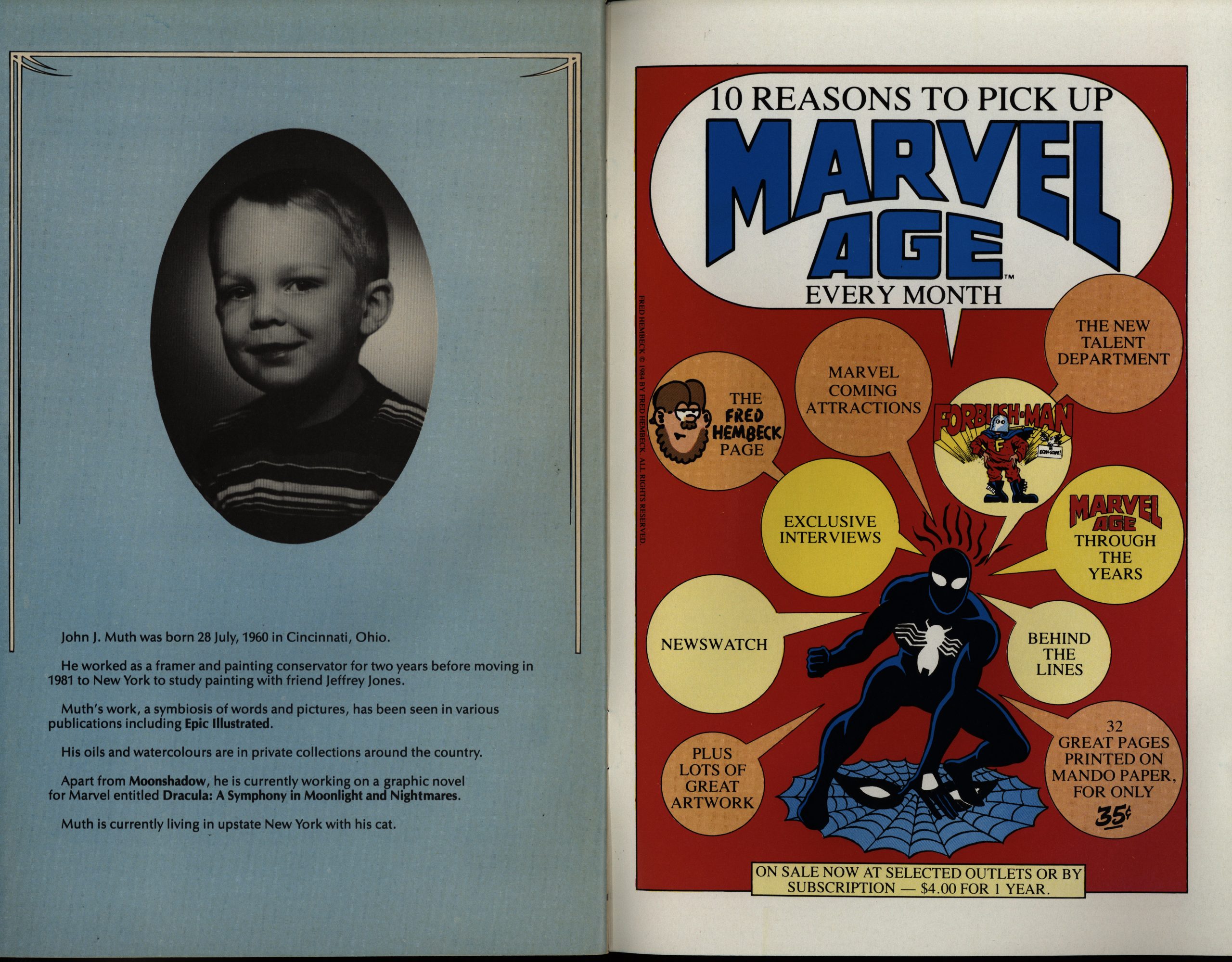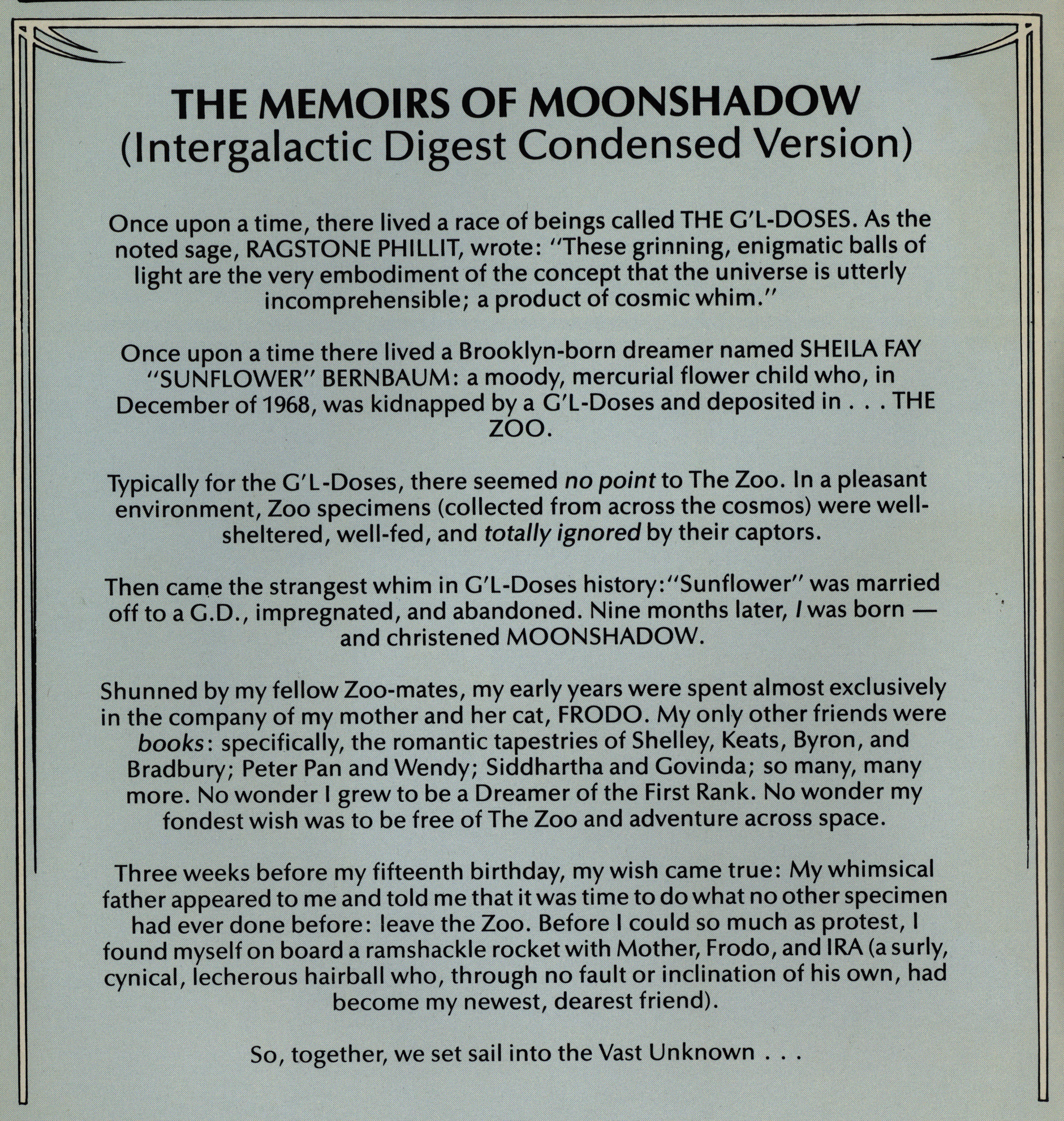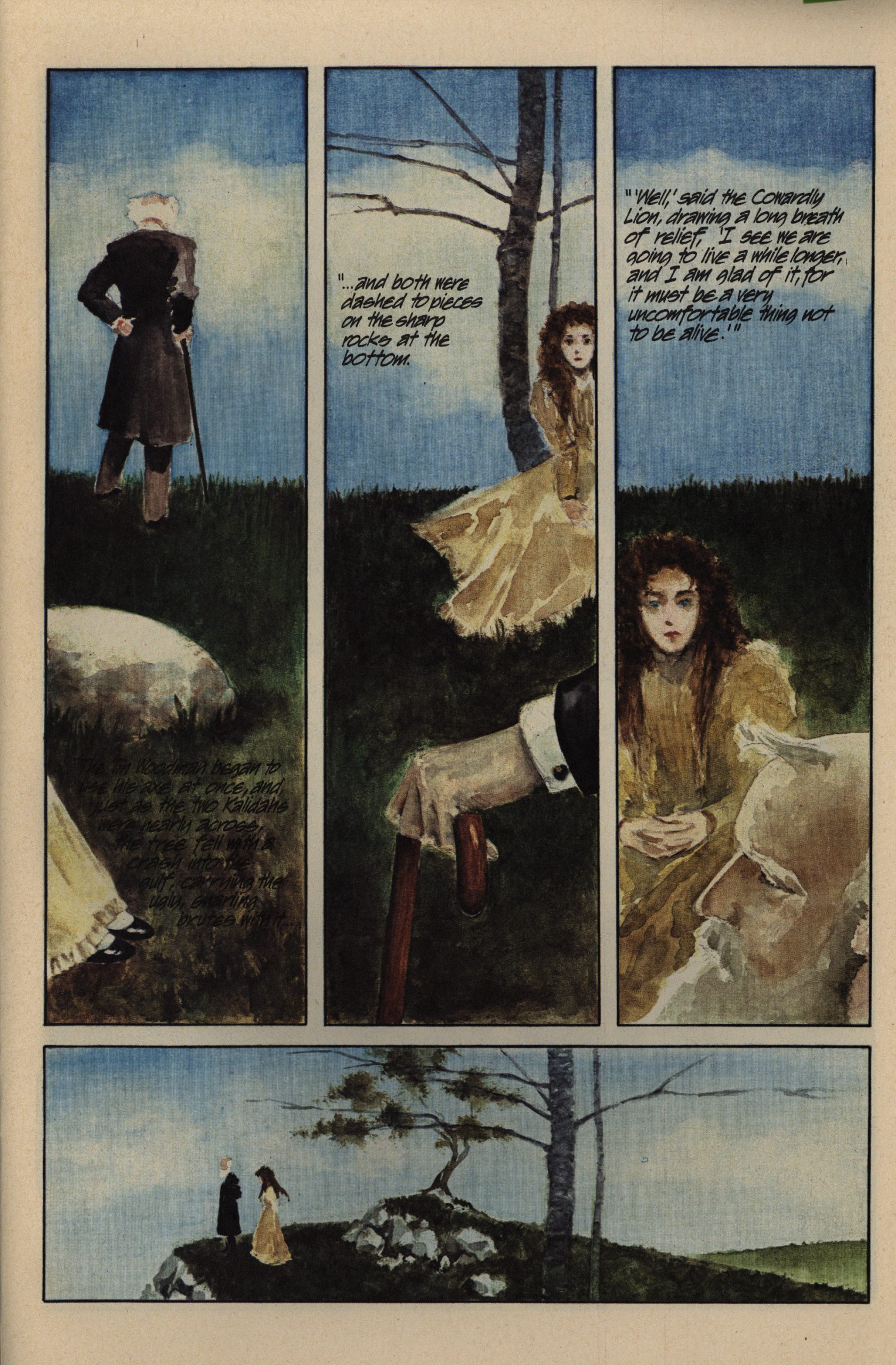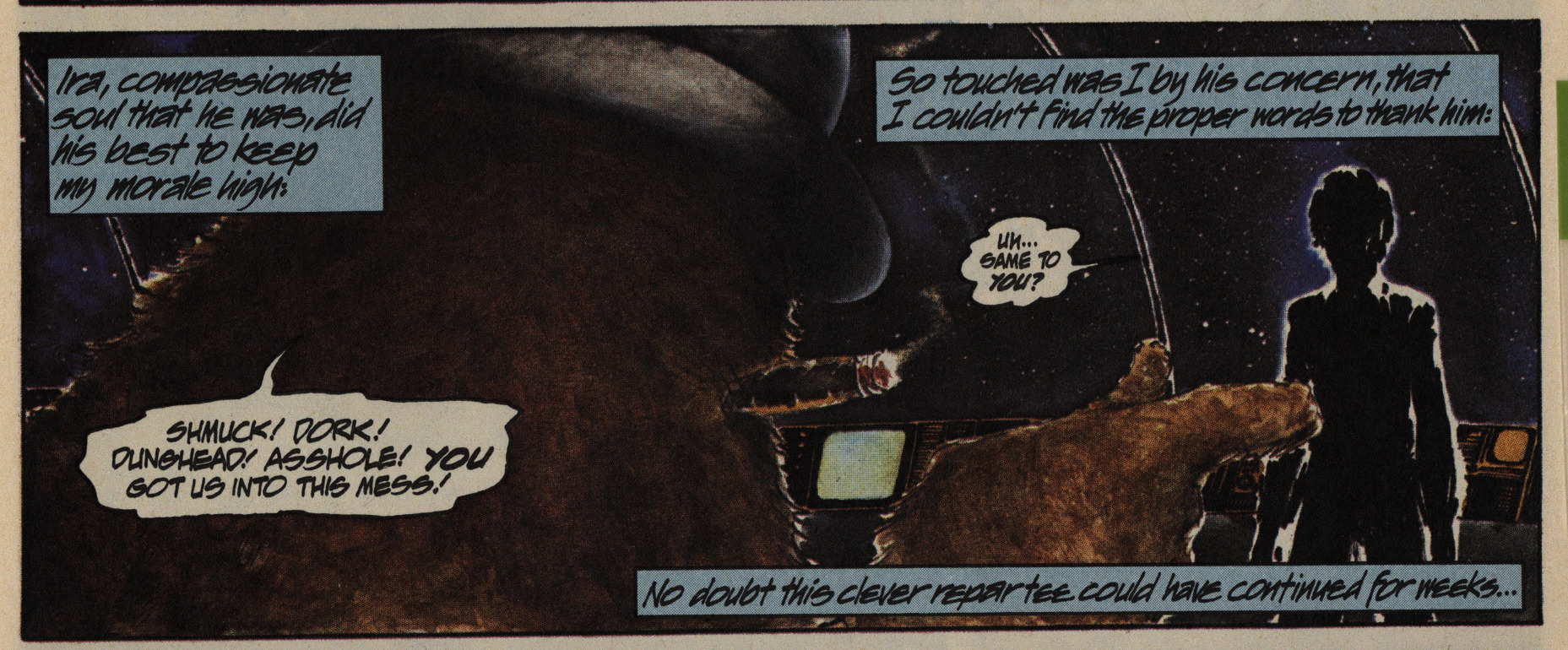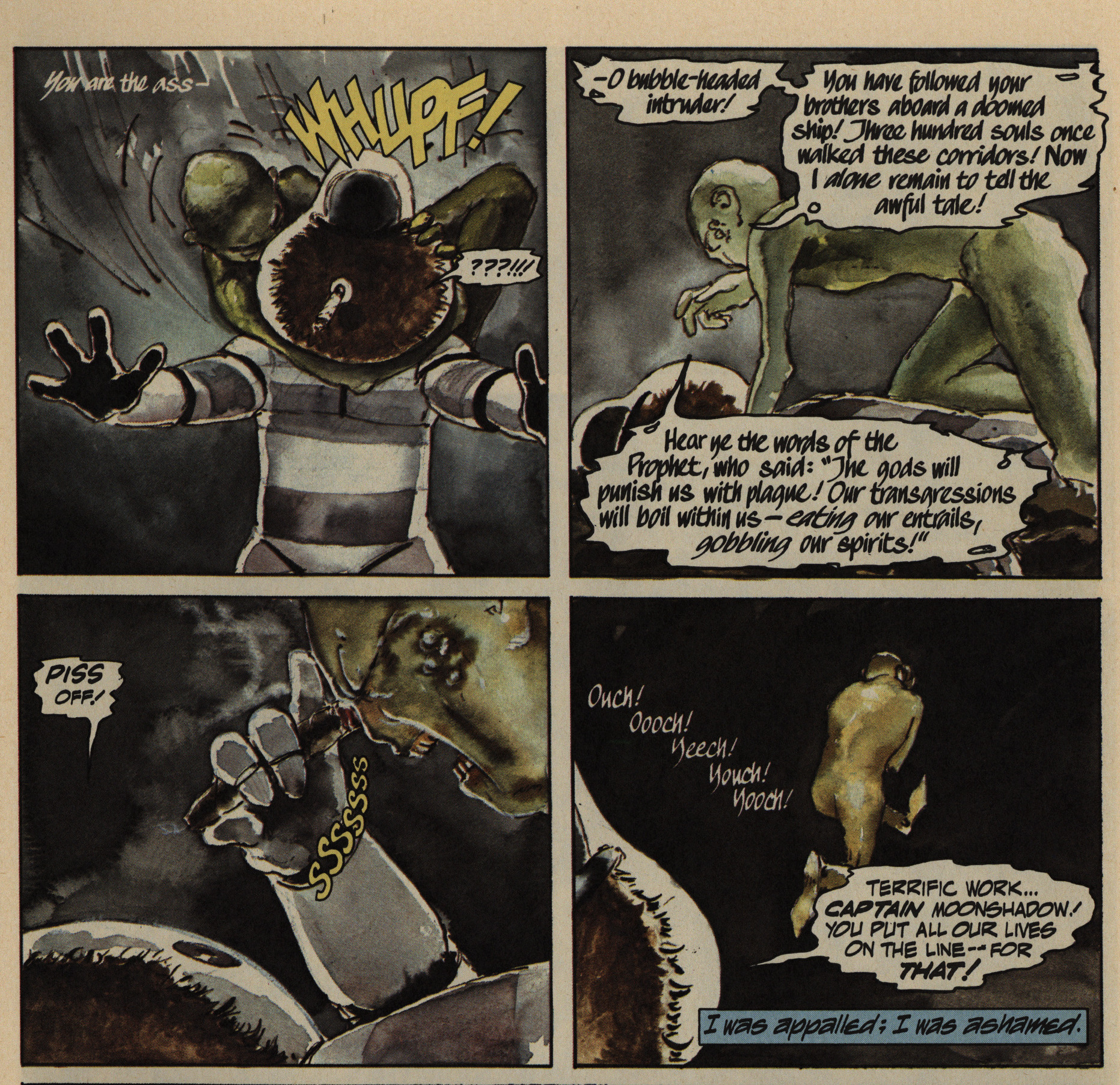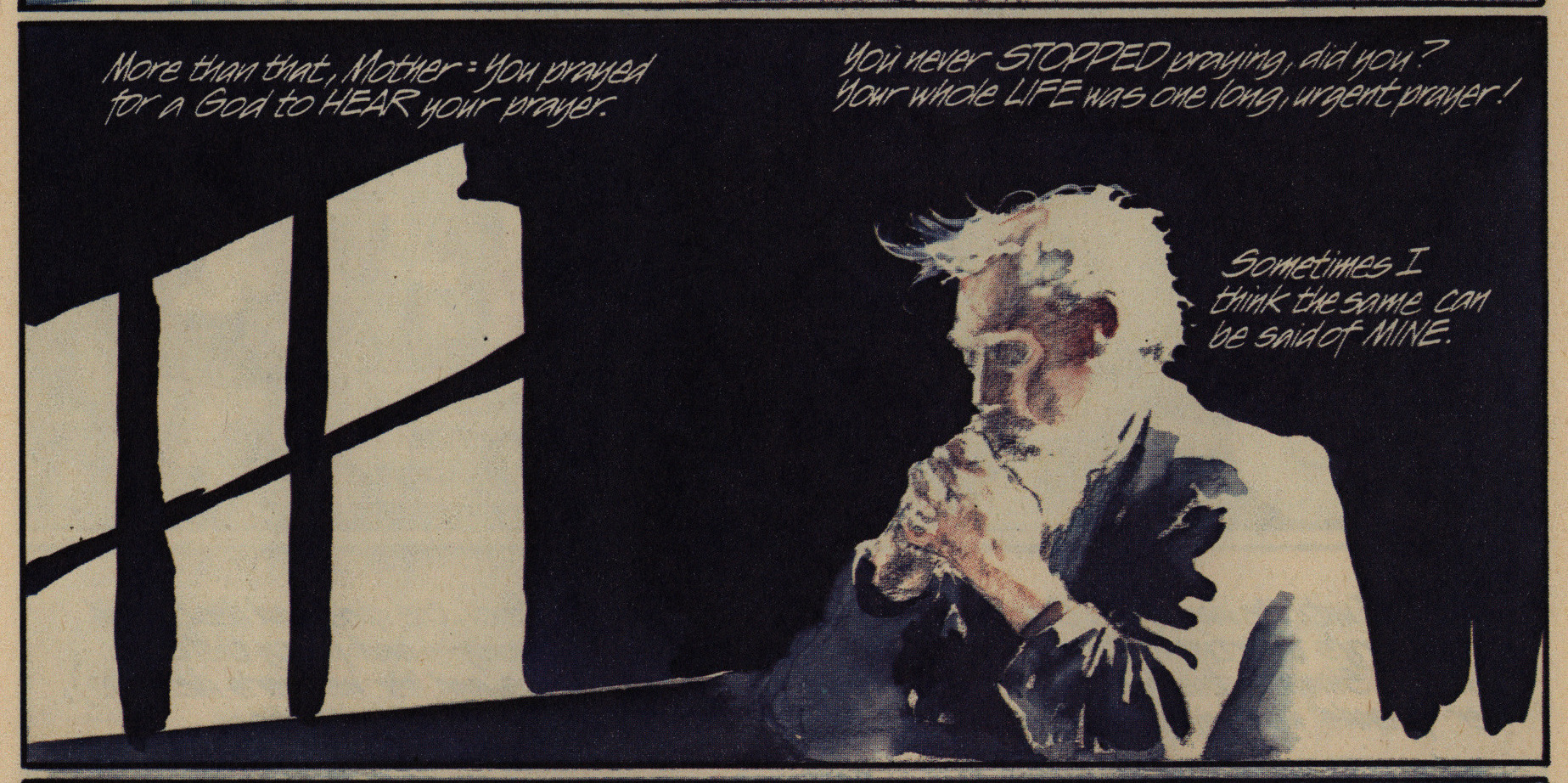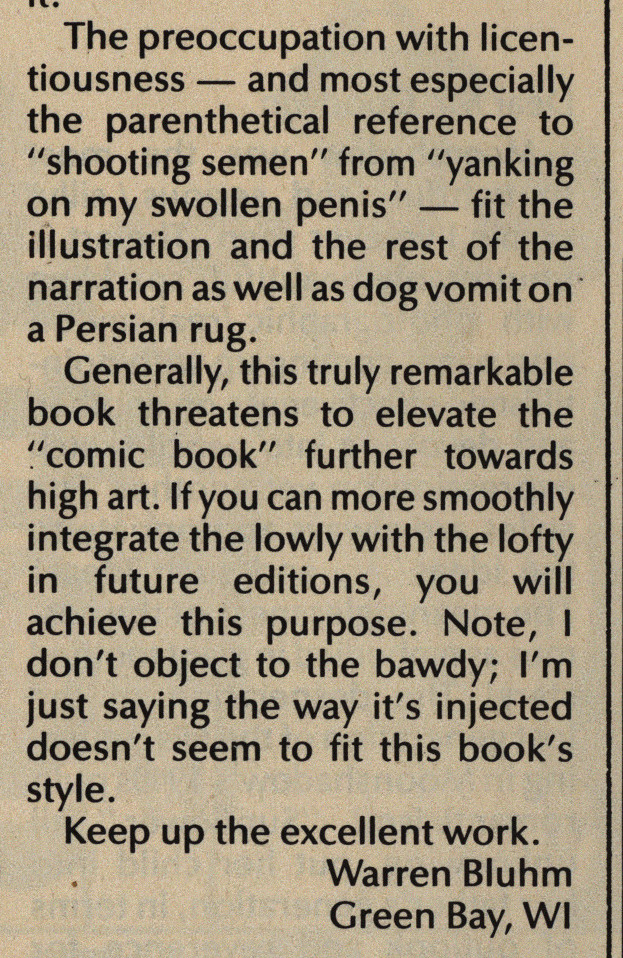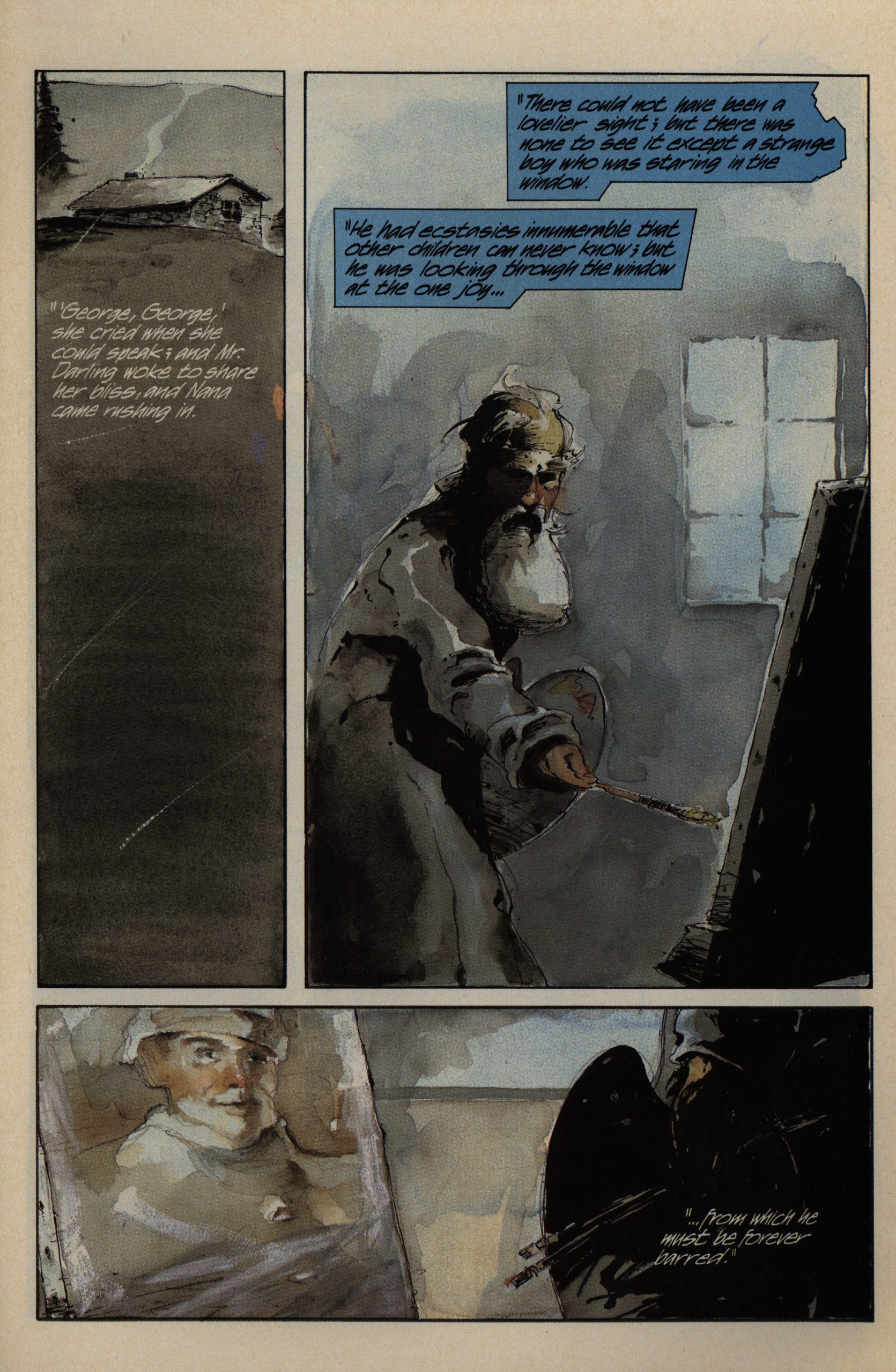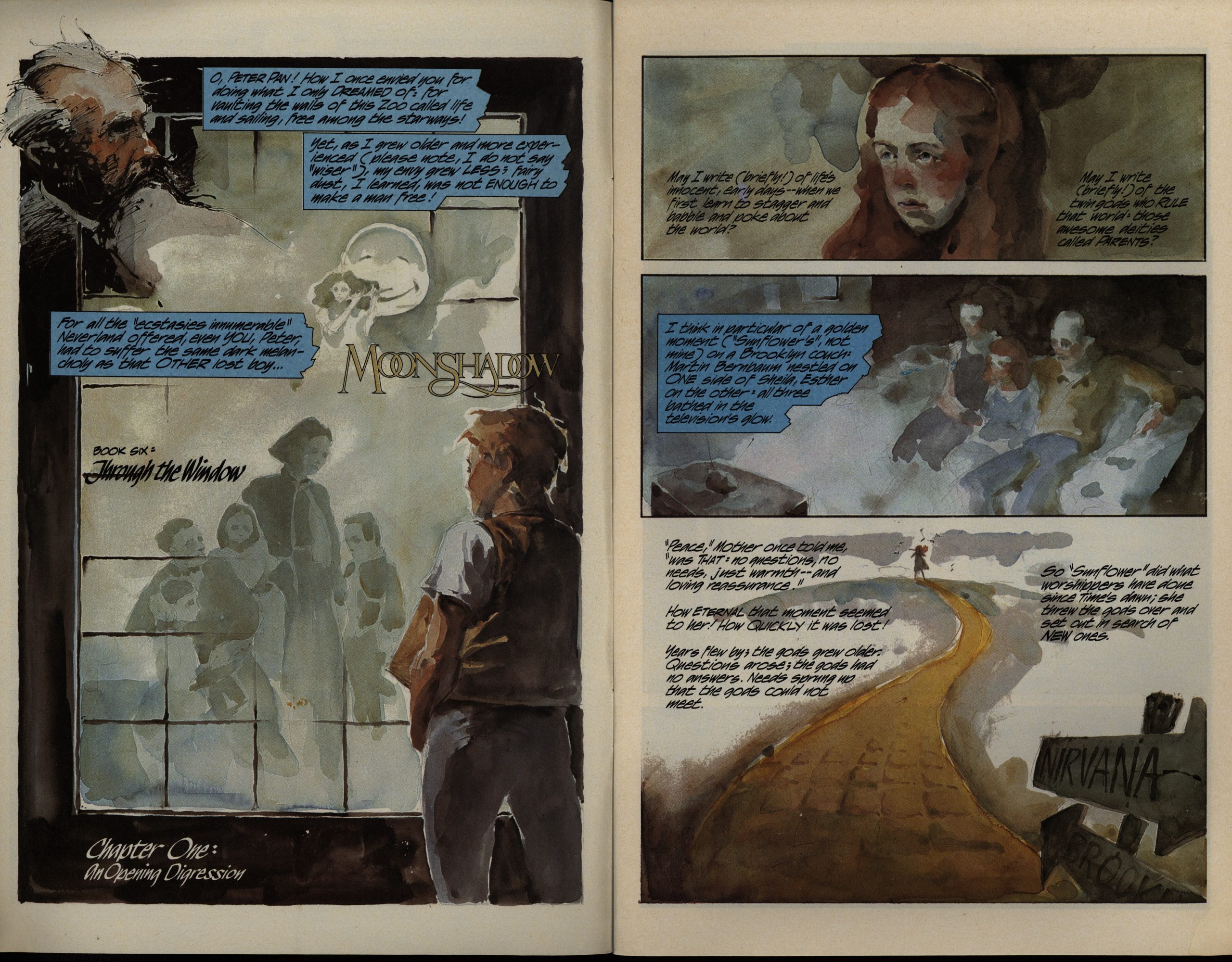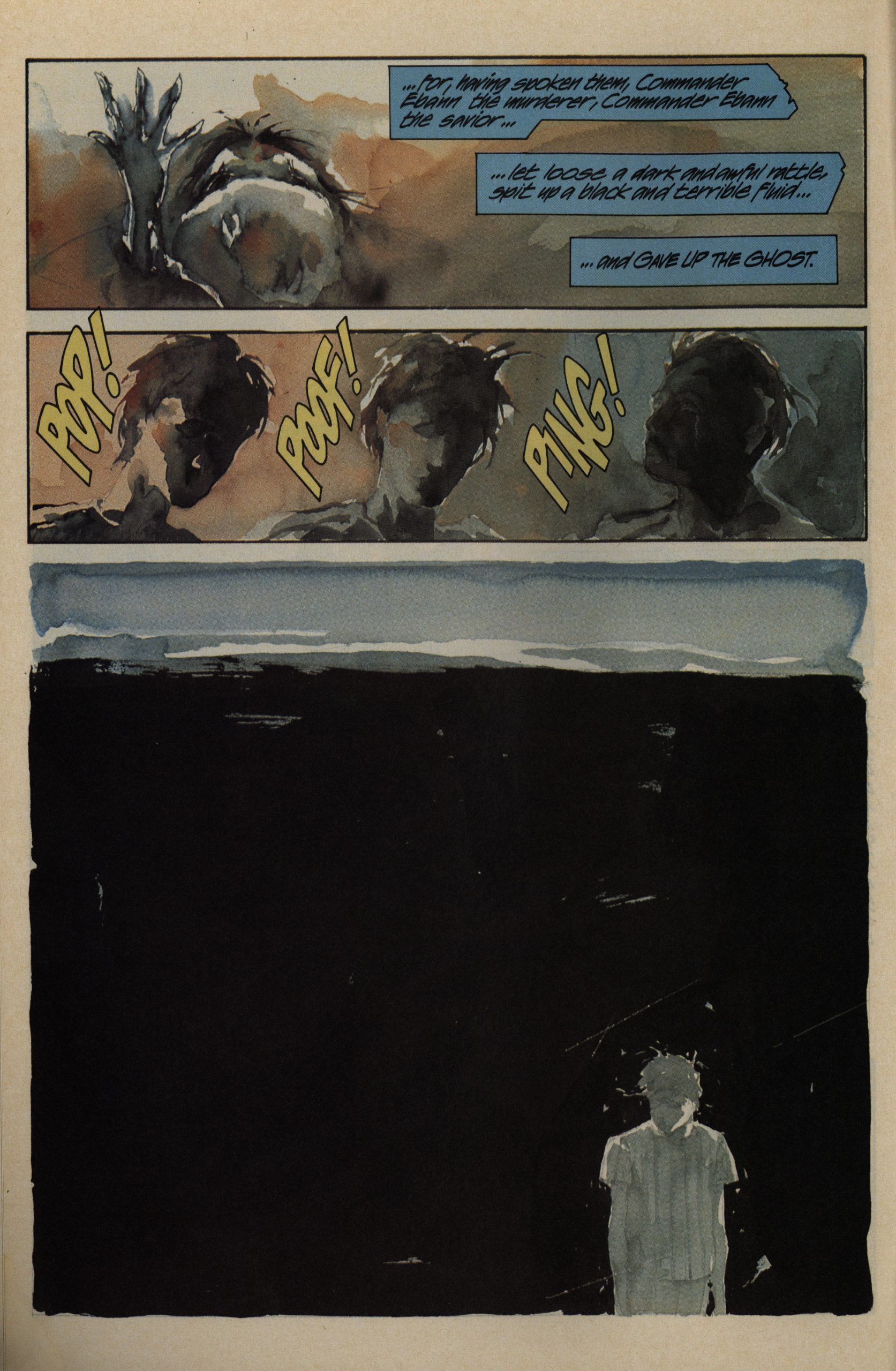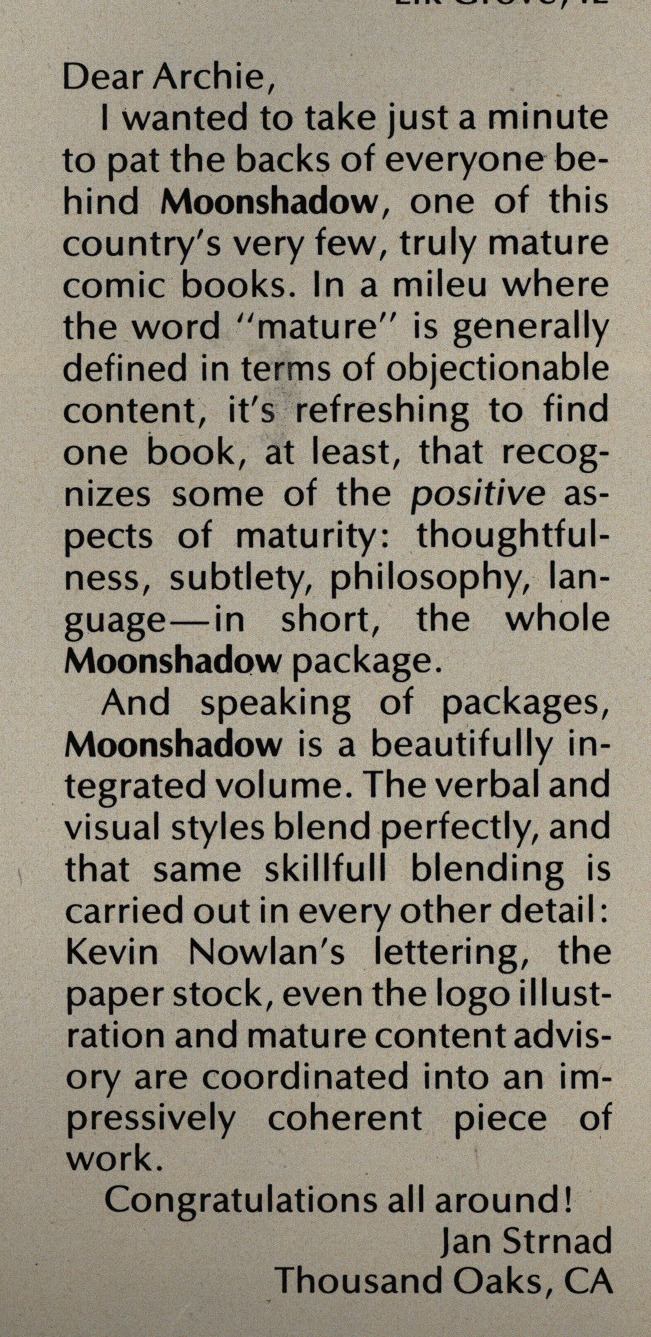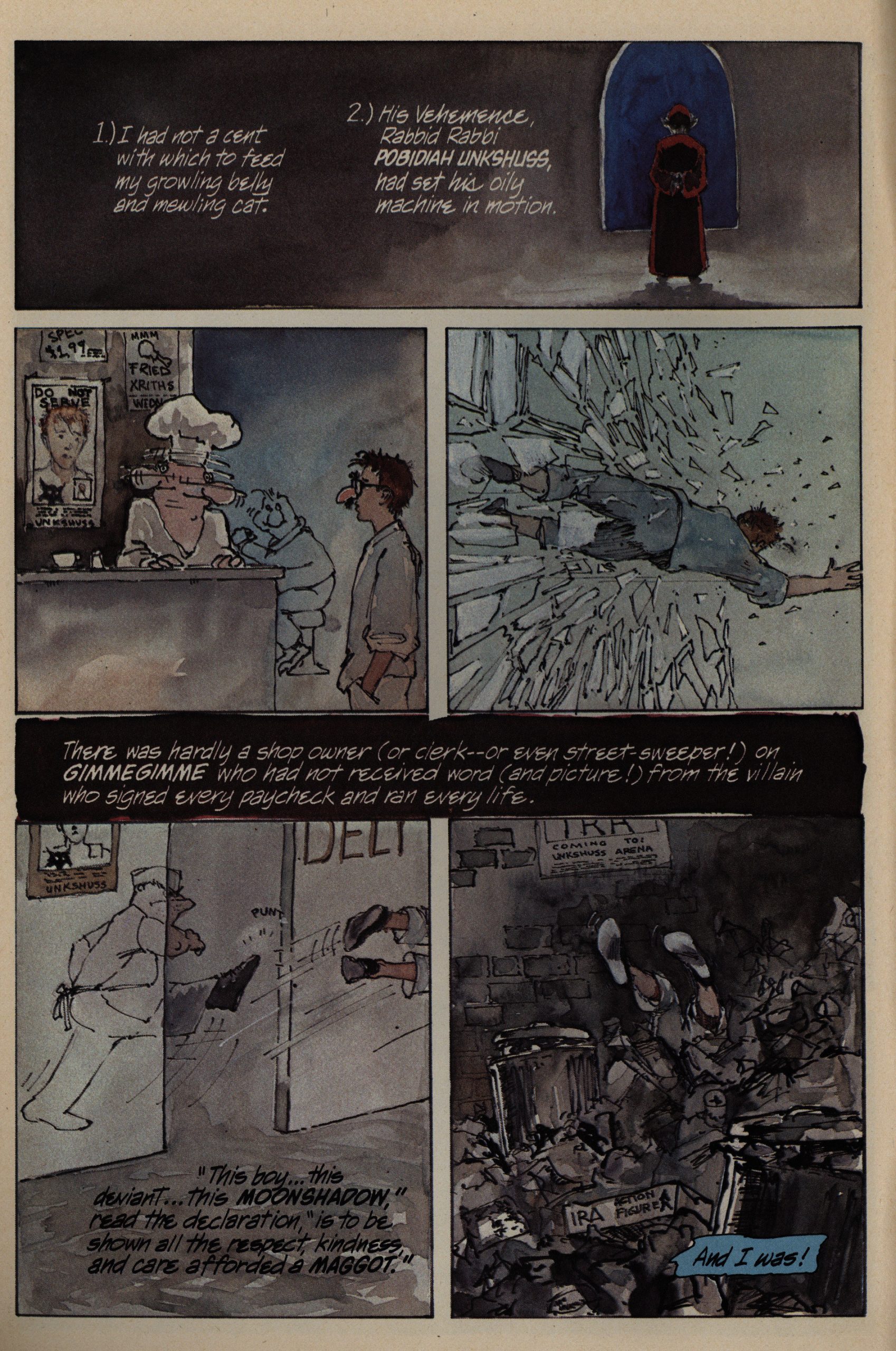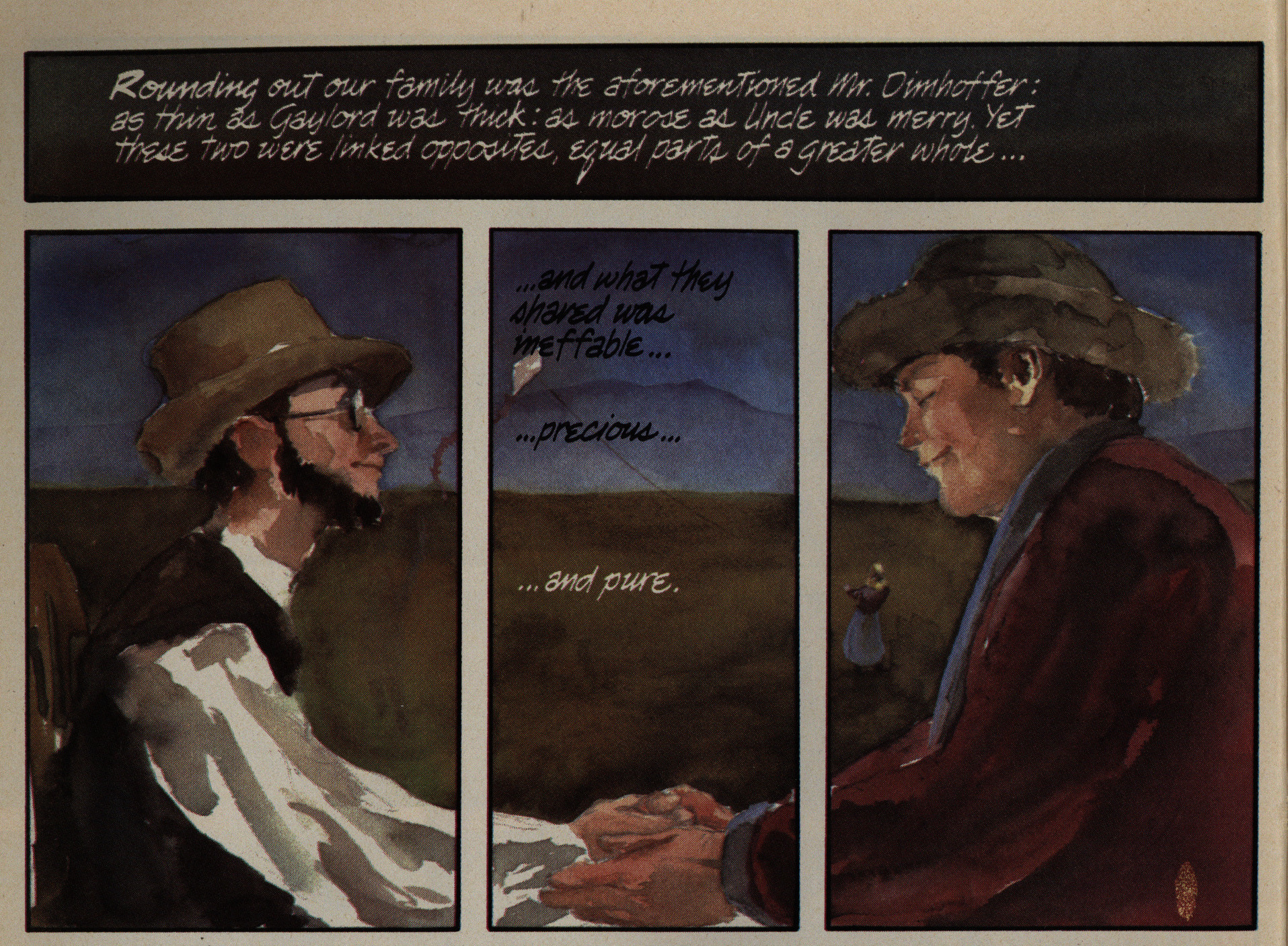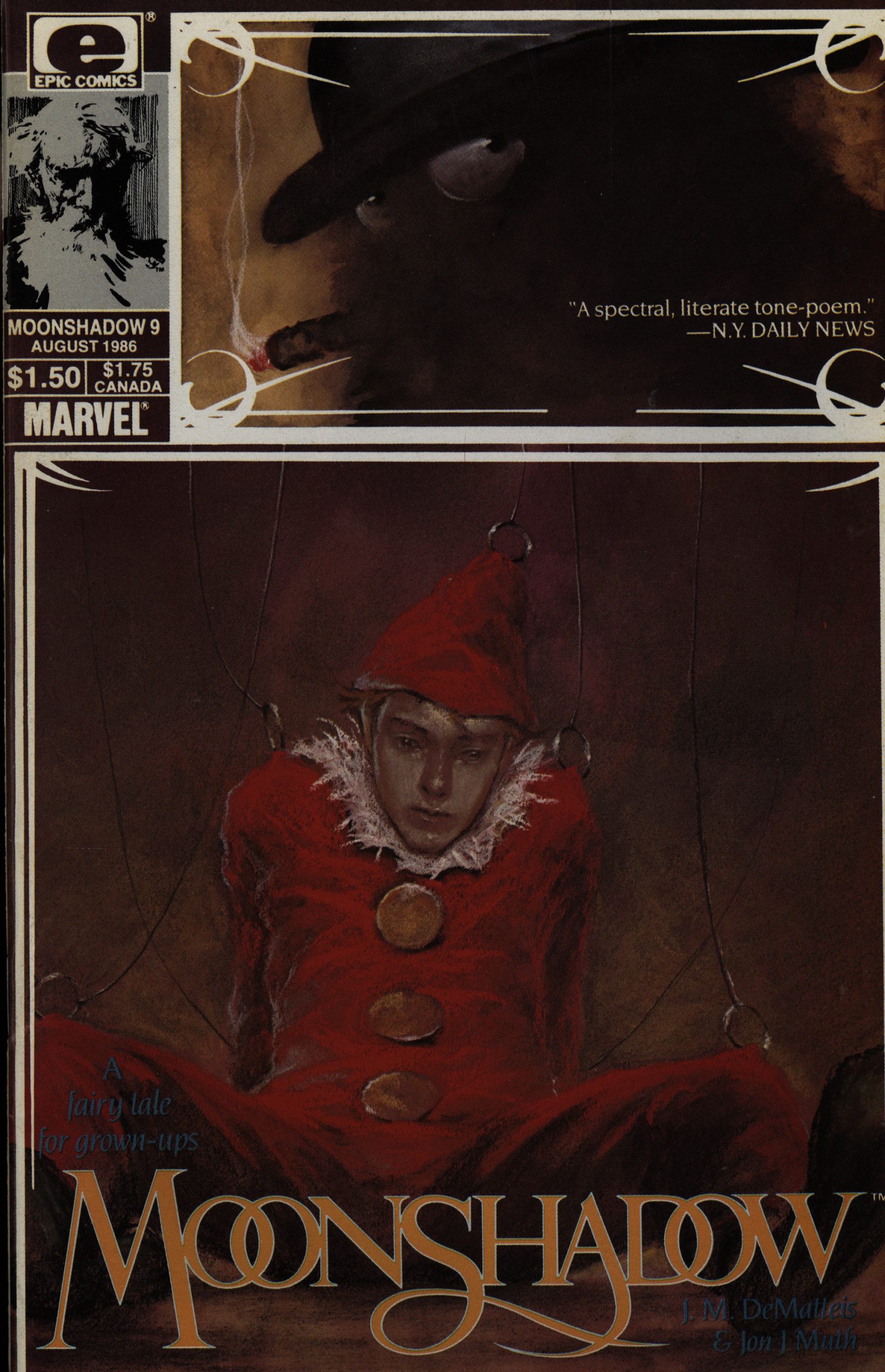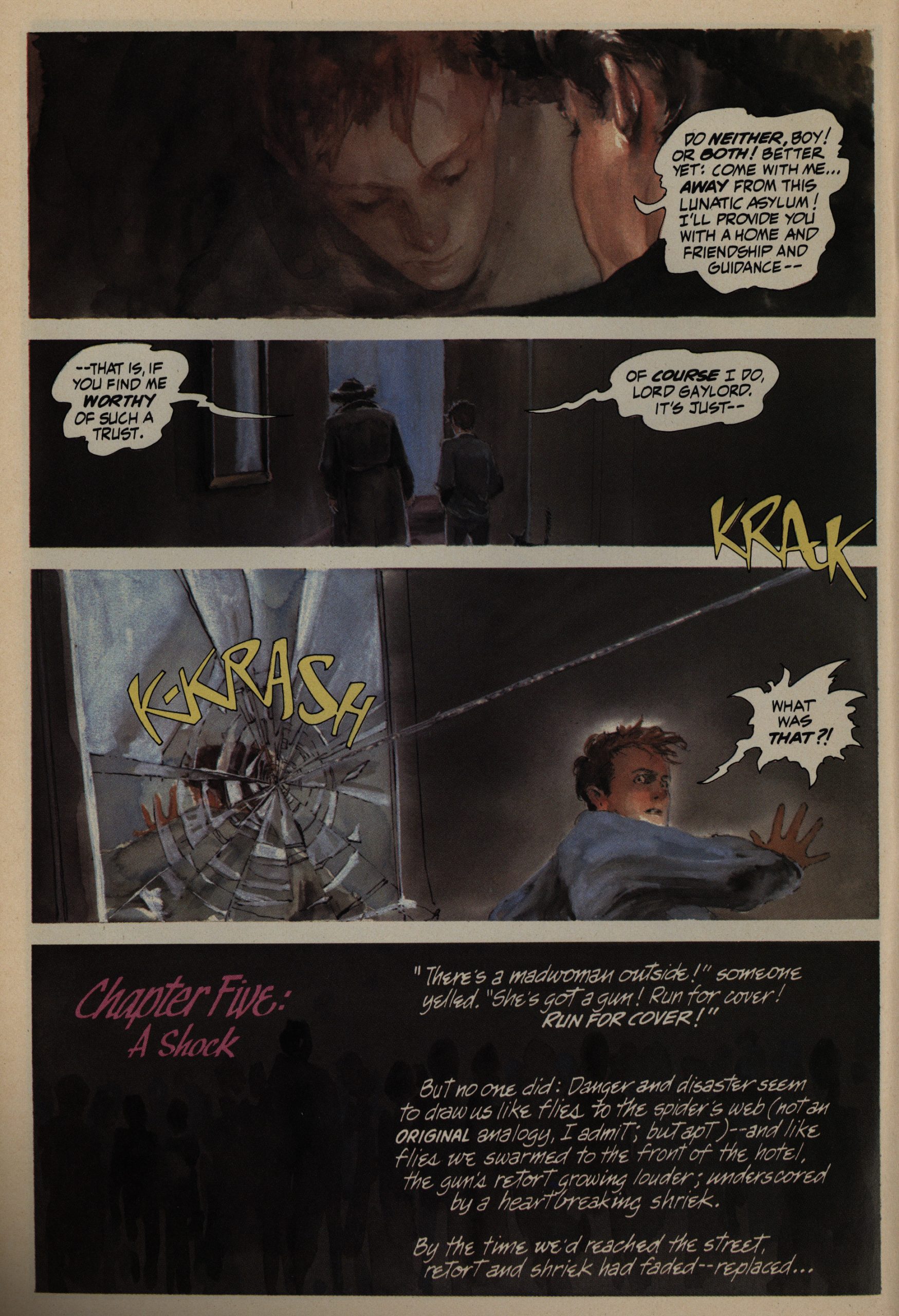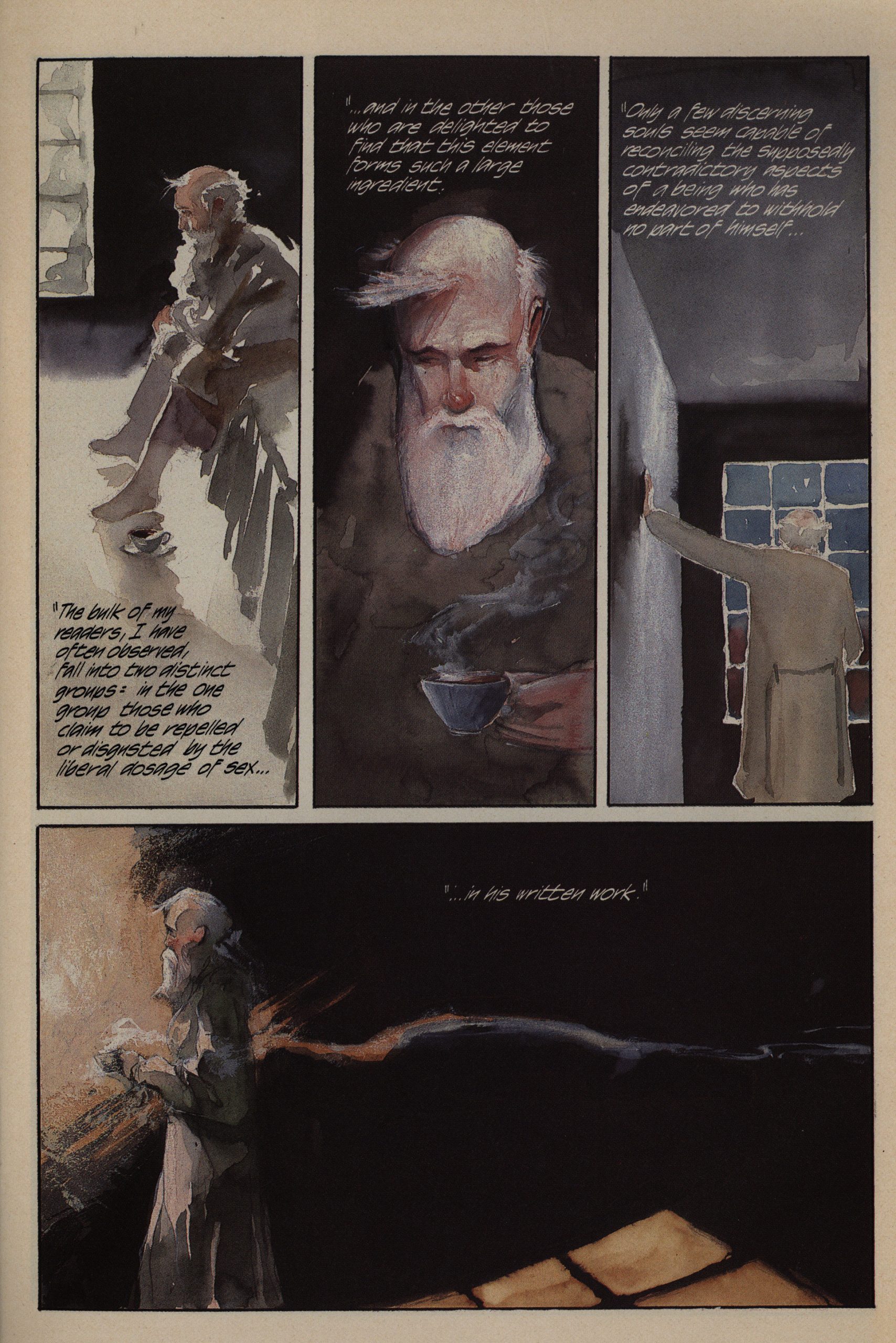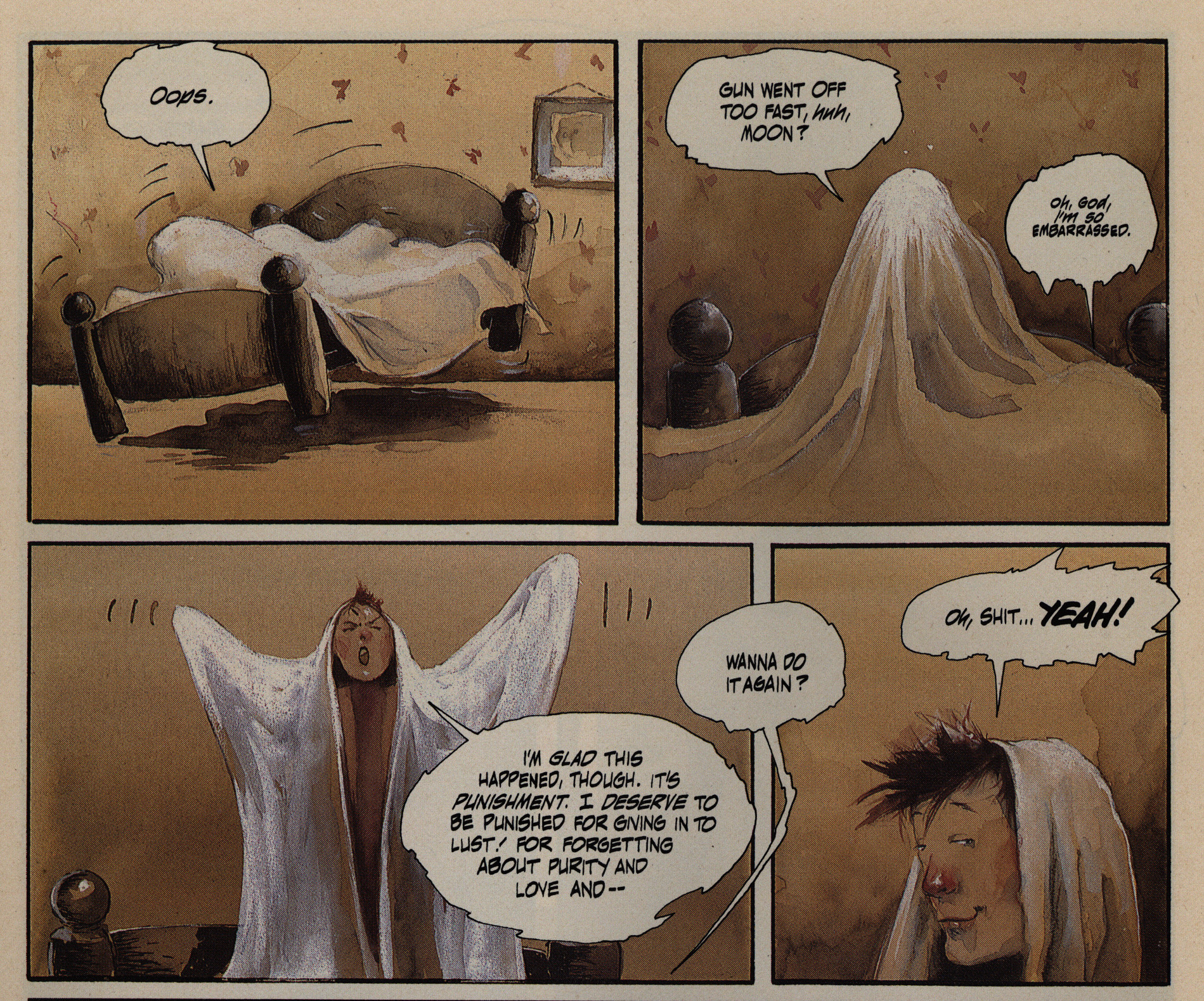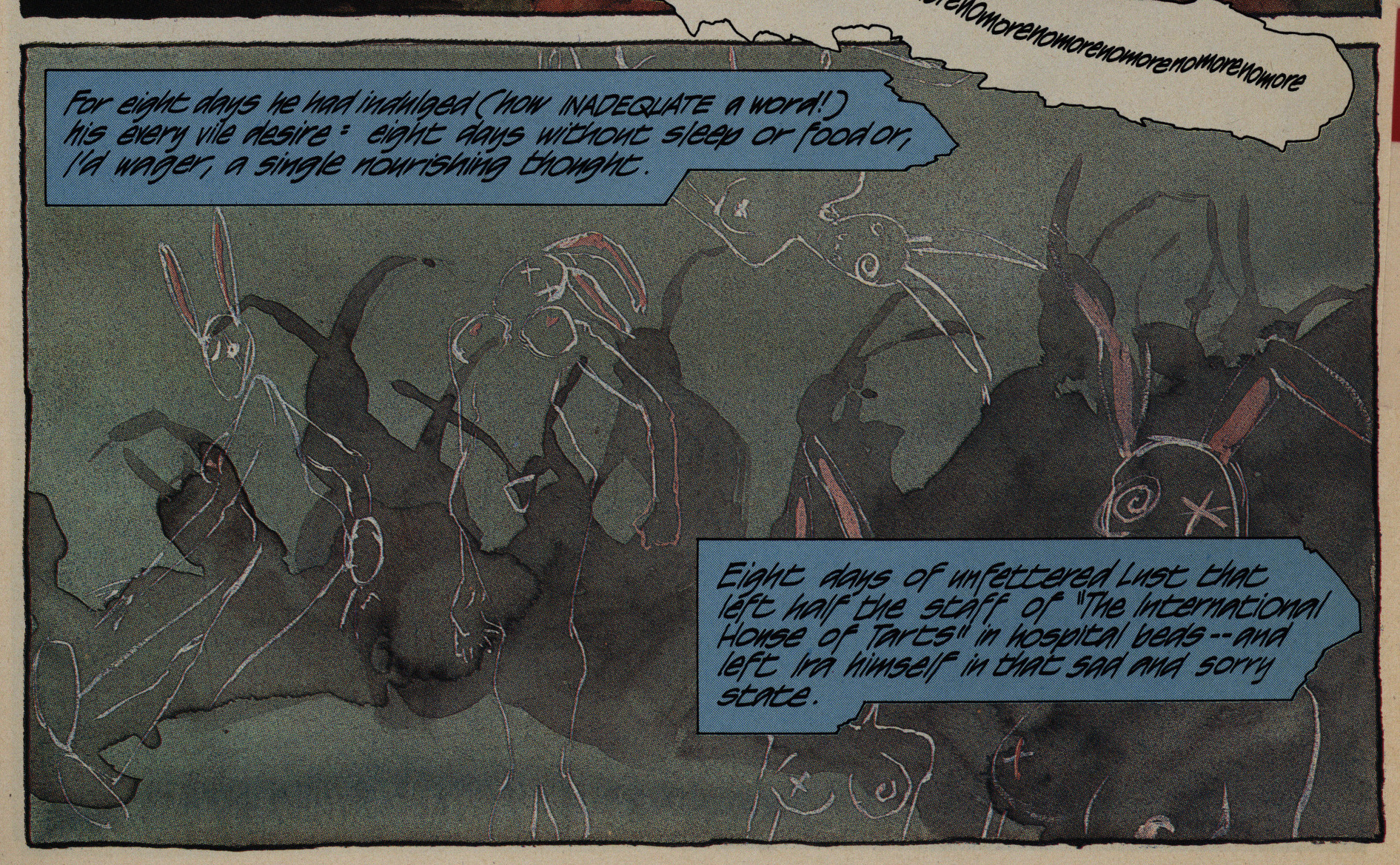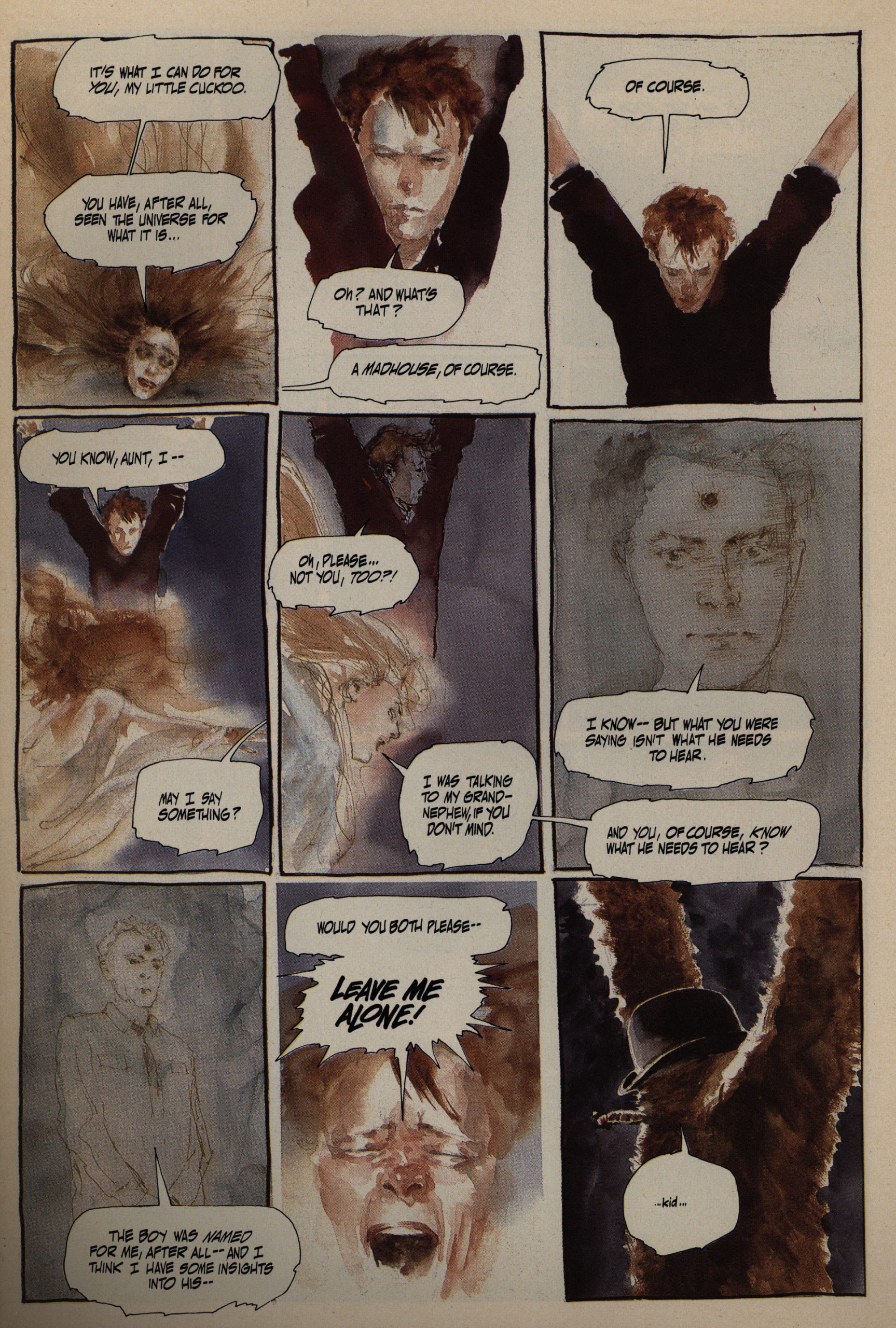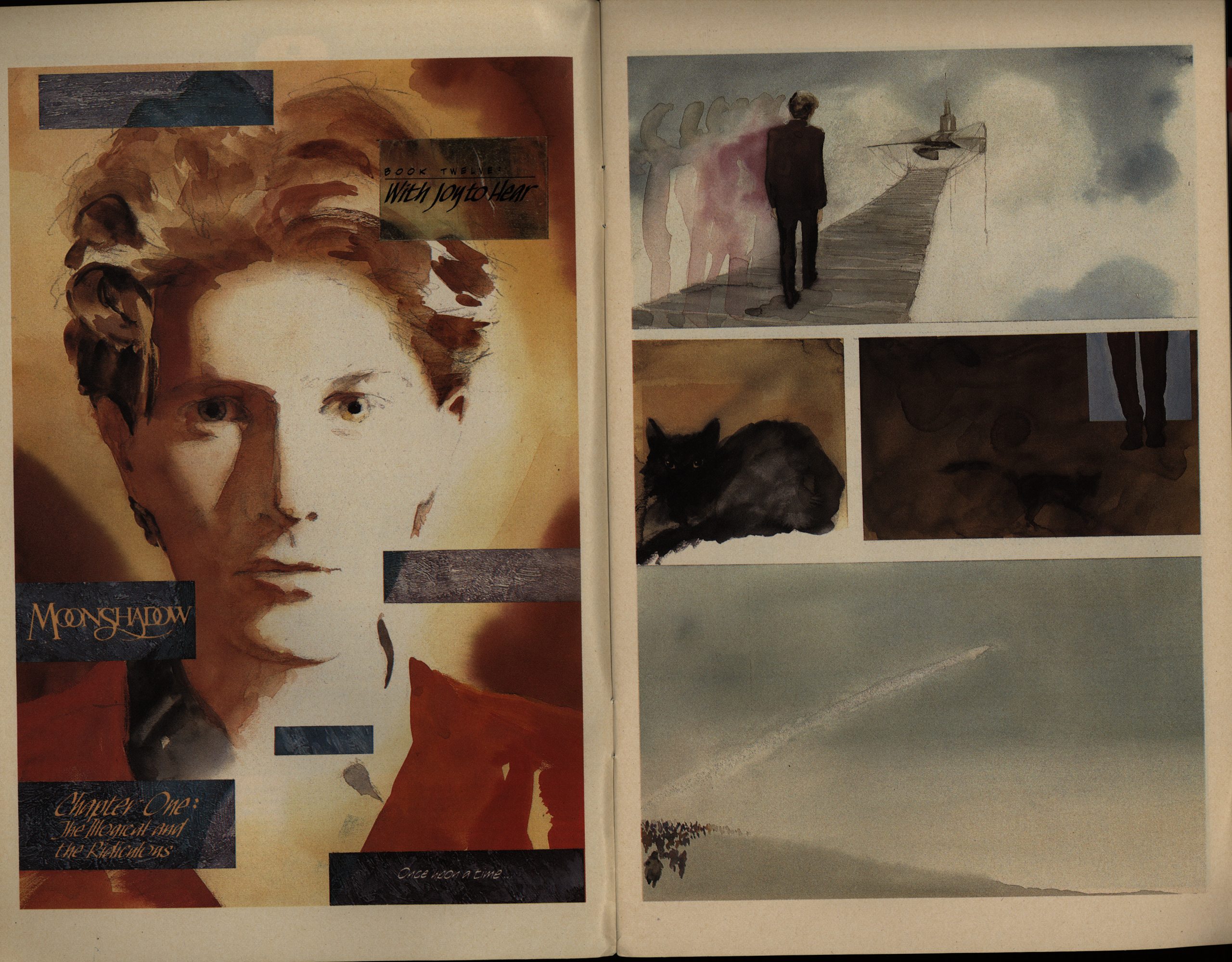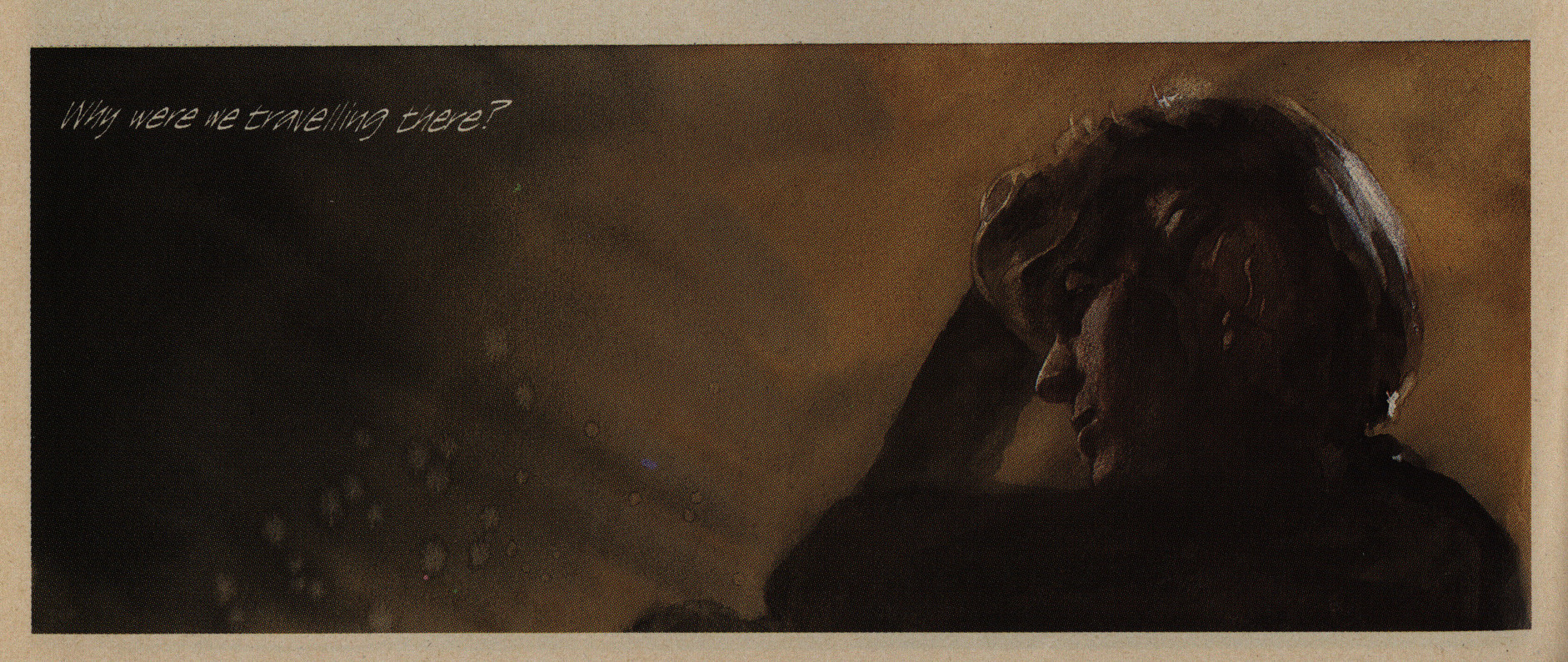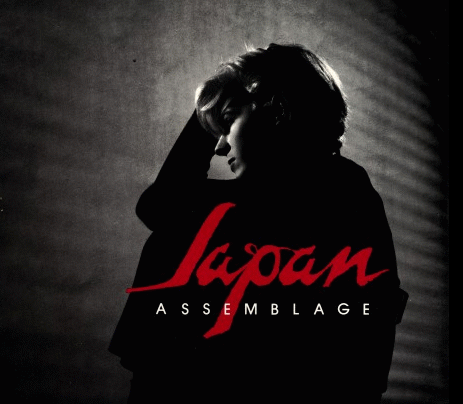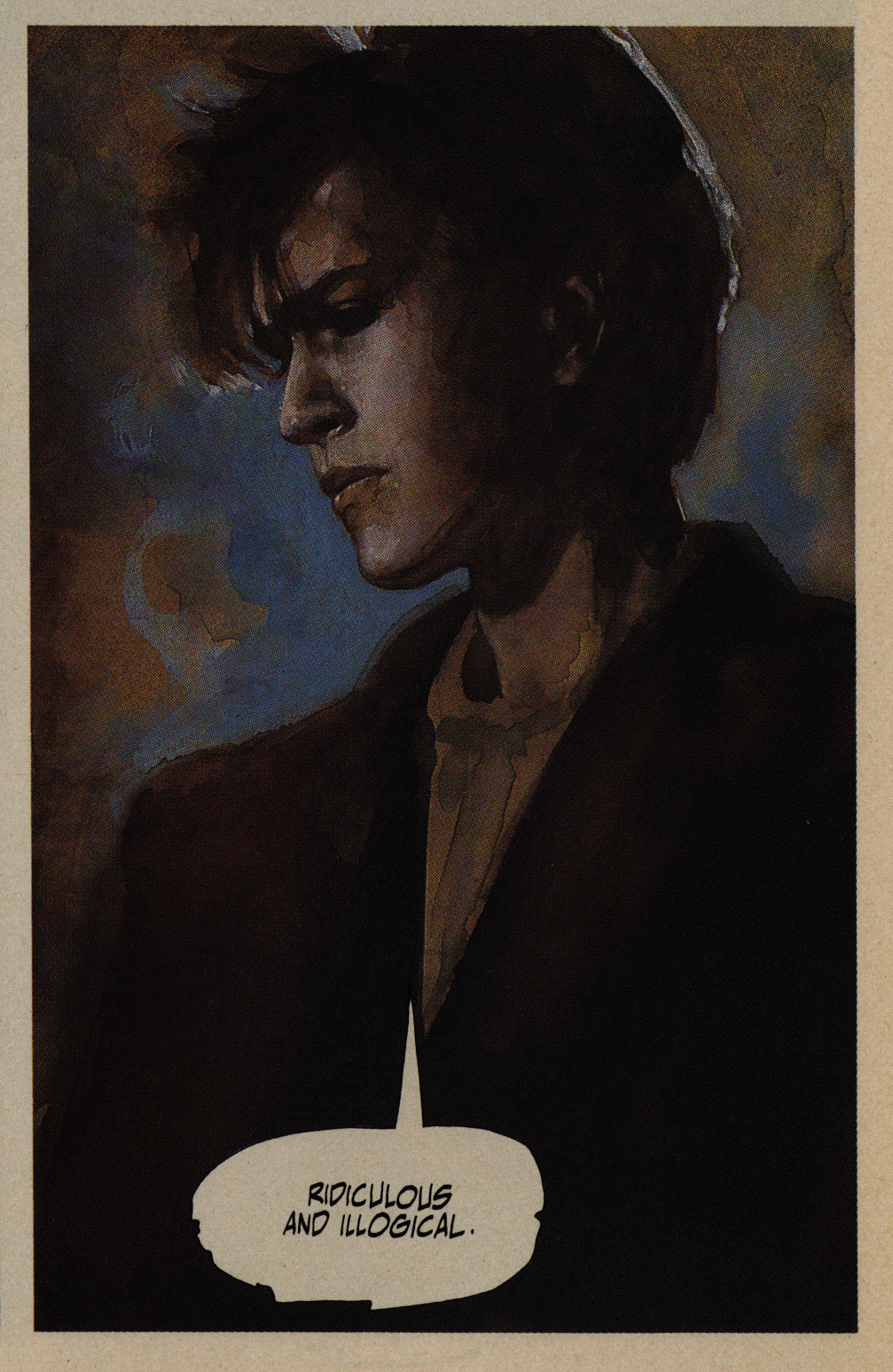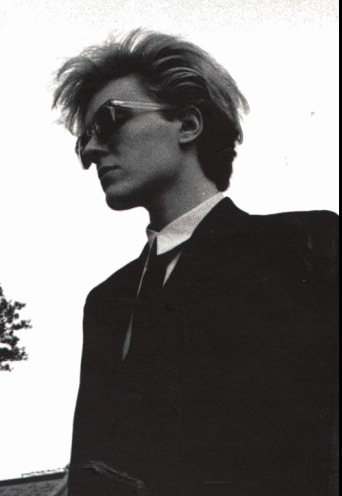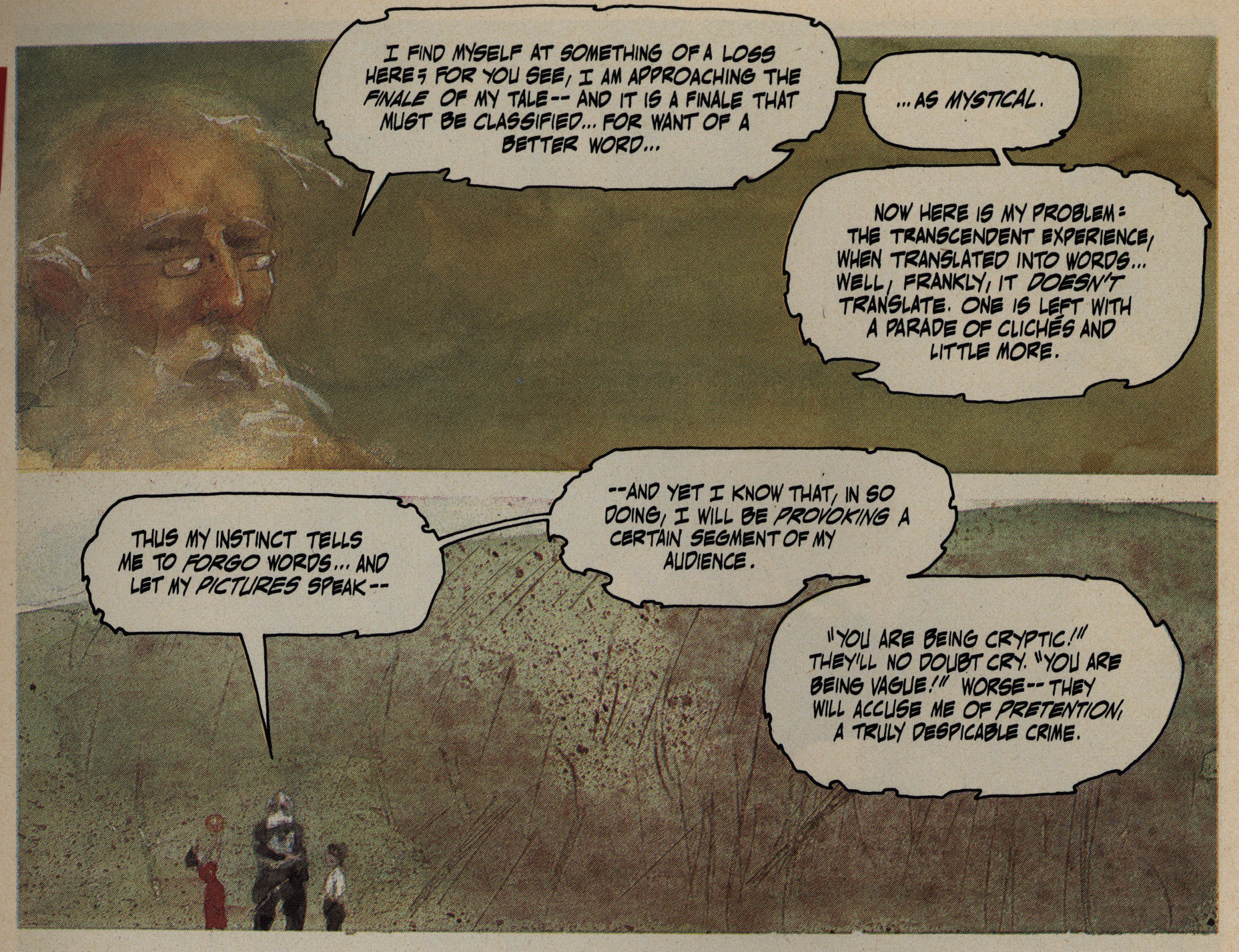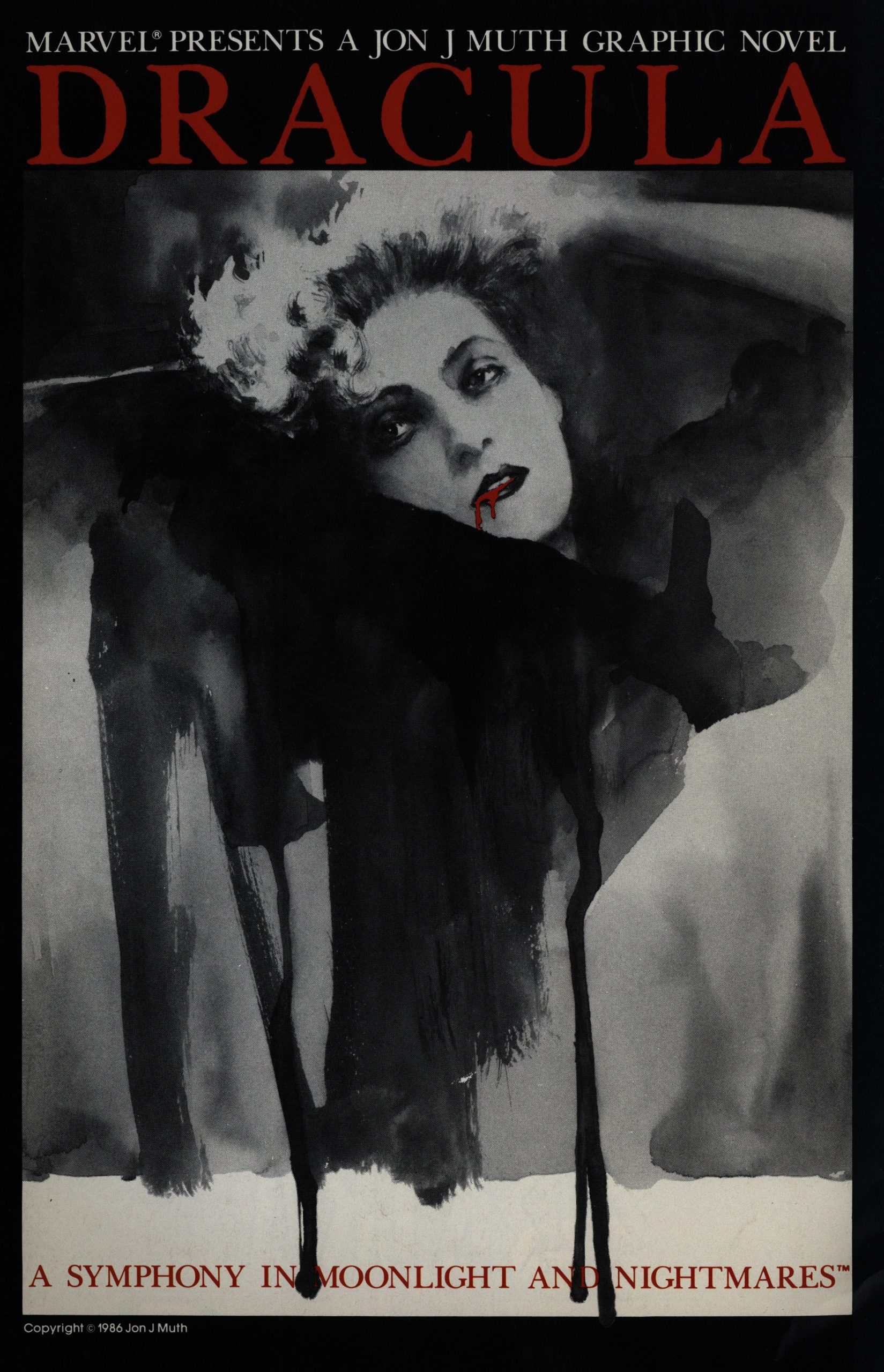Moonshadow (1985) #1-12
by J. M. DeMatteis and Jon J. Muth
Oh, man, this is a comic I remember well from when I was a teenager.
Or, rather, it’s a comic I remember remembering. Or something, because I really can’t remember anything about it except that I read it several times, and that I loved it, and that… there’s… a big teddy bear kinda guy as the sidekick? And there’s an old man with a beard? And a boy as the protagonist. OK, that’s all I remember now.
But I haven’t re-read this since (probably)… 1987. I think I vaguely remember re-reading it a lot before it was finished, but once it was over, I stopped. Was the ending a let-down? I have no idea. Let’s find out.
Goodwin did cartoons for most of the early Epic comics on the inside front cover, but not this one. I guess it wasn’t really… appropriate? Both the creators dedicate the books to their fathers, which is slightly odd since the central father in this book is an unfathomable, mysterious being who’s mostly absent. Or did I just nail the theme or what?
We start off with a quotation from Blake and some lovely painted artwork by Muth. According to Wikipedia it was the first fully-painted regular comic book published in the US. That kinda lines up with my recollection, too.
I totes respect DeMatteis for using actual poetry for these opening bits instead of cobbling together something of his own, as is what most other mainstream comic book writers did when let loose on creator-owned books at the time.
Oh yeah, I wanted to say that I was a DeMatteis fan before this book, but looking at the Wikipedia page, I see that can’t have been true. I think I’m getting him mixed up with Don McGregor? Hm.. Oh! DeMatteis did a long run on Defenders? I remember there being a wild and weird run on Defenders that I did like, so perhaps my branes are correct on that point. Still, neither DeMatteis not Muth were hot names at the time, I think, so it’s slightly odd that Epic would take a chance on an odd book like this.
The form factor of the pages in the first issue seems to indicate that this was originally pitched for a magazine; presumably Epic Illustrated. Only the first issue have these borders taking up space, so it was redirected from the magazine into a normal-sized comic book pretty soon in its history (as opposed to Six From Sirius which only switched over half-way through, if I remember correctly).
The style used in this book is something that usually gets on my tits: A narrator that tells you everything that goes on, and the illustrations repeating it. But… 1) Muth makes everything look so beautiful and c) they use the old trick of having the images say something slightly different (and often wittier) than the text. For me it works.
There’s a lot of text, and some of it is quite flowery indeed, but reading this little stack of comics today, I wasn’t bored at any point. But I think this could so easily have gone off the rails with just a tad worse writing or an artist not as good as this; varying layouts nicely while leading the eye expertly over the page.
The reproduction is really good, too. It’s printed on glossy paper which gives you deep blacks and colours that pop. Oh, and while I’m heaping praise on everything, Kevin Nowlan’s lettering really fits the narrative style, too.
The only nit-pick I have on choices in this area is the pale blue colours used on the background on most of the narration. I think it looks really unbalanced. The rest is so organic, and then there’s this really nasty flat pale blue that’s an assault on the eyes.
Oh, wasn’t there some sort of controversy about how much masturbation is mentioned (i.e., at all)?
Indeed!
Tom Heintjes writes in The Comics Journal #97, page 16
NEWSWATCH
Moonshadow upsets dealers: Marvel
considers advisories on Epic Comics
Marvel Comics is officially
considering placing some sort of
advisory on some of the titles in
their more adult Epic Comics
line. Marvel recently received
numerous complaints from
retailers and distributors about
Epic Comics’ Moonshadow—
enough flak for Marvel to begin
considering advisories and to
accept returns for the book.
In Las Vegas: At the Glenwood
Distribution retailers’ meeting,
held in mid-January, retailers
expressed their negative feelings
toward the 12-issue bi-monthly
series Moonshadow. Jim
Wanser. a New York retailer,
went so far in displaying his
outrage over the book as to
approach Carol Kalish, Marvel’s
direct-sales manager, who was
addressing the retailers at the
time. Wander was particularly
offended by a caption in
Moonshadow that read: “This
Dante-like belief in a pure and
perfect Beatrice didn’t prevent
me from shooting semen high
and low once puberty came
a’knocking. Night often found
me in some musty corner of the
library, clutching a ragged copy
of Lust Rumble in one hand and
yanking on my swollen penis
with the other. With the dawn
came shame, repentance, and a
vow of chastity as sincere as it
was short-lived.
Wanser walked up to Kalish,
copy of Moonshadow in hand,
and asked her to read the
caption. According to Wanser,
she declined to do so. ‘ ‘l asked,
‘Is it because you can’t or you
won’t’ and she she said, ‘I
won’t, Wanser said. “It was
evident that she had never seen
the book before. The retailer
continued, saying that Kalish
passed Wanser’s copy of the
comic On to Michael Z. Hobson,
Marvel vice-president, who read
the caption to himself and then
asked if the product had really
been put Out by Marvel. “l
don’t think he really believed it
was a Marvel product,” Wanser
said.
Further, Wanser expressed his
outrage at Marvel for putting
the book Out without adequately
warning retailers of the strong
language the book contained.
v’ We were caught very much by
surprise, and we were very, very
upset at Marvel—they are
perpetrating a fraud on the
retailers.”
•Under consideration
Wanser, as well as other
retailers who were in Las Vegas
for the retailers’ meeting, said
that Kalish hinted that Marvel
would more seriously consider
using labels on their more adult-
oriented books. In the past,
Marvel has steadfastly refused
to label their books, instead
choosing to place warnings only
in advertisements and on
shipping schedules, as they did
with Void Indigo. Archie
Goodwin, editor of the Epic
line, has traditionally been
against any sort of printed
advisory, but did say that he
was considering changing the
way they are currently used.
Goodwin said he would like
to pattern his own advisories
after the television channel,
Home Box Office’s, way of
using them. “If there’s strong
language and nudity in a movie,
HBO will print a notice in their
movie guide that says ‘Strong
language and nudity,” ‘ he said.
Epic’s current way of warning
as to adult content is to
publish “Recommended for
Mature Readers” in advertise.
ments and in the flyers that are
sent to retailers and distributors.
Thus, Goodwin would like to
make the advisories more
explicit as to the contents. Still,
he said he would resist putting
the warning directly on the
books themselves. In the past,
Goodwin has expressed the
feeling that advisories are akin
to censorship, arid thus fights
placing them on the books. On
July 24, 1983, a debate on
ratings was held at the Chicago
Comicon, at which Goodwin
was present. There, he said,
I think that the price
structure of Epic Comics, the
fact that it has a different
imprint,… serves to key the fact
that this is slightly different
from the regular Marvel Comic,
and I think that’s enough.” He
also told the Journal that the
decision to use advisories was a
“committee decision”: “It’s
Marvel’s opinion,” he said,
although the decision applies to
Epic, which is a different
imprint.
He also said that One of the
reasons he was considering the
tactical change was Moon.
shadow. • ‘We mentioned that
there was some nudity, but the
strong language took some
people by surprise,” Goodwin
said. For some time now, Good-
win has been supportive of
sending around Xeroxes of
books that retailers and distribu-
tors might find Offensive as an
alternative to advisoties. Steve
Saffel, the assistant promotional
director to the direct-sales
market, as well as the liaison to
the specialty press, said that the
art was indeed photocopied and
sent around to distributors and
retailers, but this did not stem
what many retailers found most
offensive. Moonshadow’s art
was painted, and therefore the
lettering was done on overlays,
separate from the painted pages.
The photocopies, however, were
just of the art, designed to warn
people of the nudity, and did
not contain the dialogue. Thus,
people were taken by surprise
when the book came out with
what some considered strong
language.
[…]
She said it was possible
that Marvel might start using
them sometime, but she didn’t
say unequivocally one way or
the other, according to the
retailer.
The issue was made returnable for outraged retailers.
*eye roll sprain*
So all the subsequent issues had this on the cover:
As warnings go, that… more looks like ad copy that a warning about naughty, naughty contents? Goodwin (if it was his idea) played that one well, I think, seeing as how he was against the entire labelling issue.
Anyway, in the first issue we also get bios of the creators. The writer turns out to be a dog person…
… so the presence of the cat in the book is explained by the artist being a cat person.
And… that’s a pretty incongruous ad. Only the first issue has a non-Epic ad.
Each subsequent issue has a recap (of sorts) written in a variety of styles. Mostly the above one, but there’s a couple written in a Waiting for Godot style.
The second and third issues are printed on matte paper, which… doesn’t look as good for this style of colour work as the shiny stock. It’s still pretty good. However, they aren’t always completely successful in making the captions legible when not in those awful pale blue boxes.
Should I say something about the plot? It’s about a teenager out having adventures with his best friend, hopping from planet to planet.
There’s a bunch of action.
And annoyingly enough, there’s a lot of deep, deep thoughts about god.
The letters page (there’s seldom more than one; most of the issues have 31 pages of comics) is very, very positive. I think this is the only one that had something negative to say, and predictably enough, it’s about semen.
The series has a great sense of rhythm. Each issue starts with a page like this; the protagonist grown old and a quotation from something or other…
… and then a page that says there the quotation is from, and perhaps something that says what this issue is going to be about, and then usually a page that’s a about the protagonist’s mother’s past. This really works for me: Even reading the series this way, in one sitting (more or less), this beat every 30-ish page or so gives it even more of a hypnotic, fairy-tale quality.
What doesn’t work for me is the overall structure of the series. We basically get a bunch of shorter “adventures” in the first issues, and then we’re dropped in one place and stay there for many issues without there being anything leading up to that development. At the start of the series, it felt like this surely had to be plotted up well in advance, but the further along I was reading, the more I felt like DeMatteis didn’t really have a plan and was making it up as he went along.
If he really outlined the thing this way, in all its formlessness, then… Well, perhaps he’s just against structure? That’s a stance to take.
And while most of the pages are drenched in words, he does know when to pull back when needed and let the artwork speak for itself.
Jan Strnad writes in to compliment the creators: Even on the mature content advisory on the cover.
I really like the way Muth mixes more cartoony linework with his moody painted style.
It turns out that Lord Gaylord is gay. Probably. Well, that makes sense since His Eminence Unkshuss is really unctuous. I guess DeMatteis isn’t the most subtle writer ever when naming characters.
I have no idea what NY Daily News is, but… “a spectral, literate tone-poem”? I guess they really liked it.
But I just wanted to mention that I really like the cover design. I mean, they had to work around the “Epic Comics” box, probably mandated from on high, but then they used that limitation to their advantage, I think, with two boxes (one main image below and one smaller one above). It’s nice.
Huh? That was a weird transition from the previous page. Did they drop (or censor) a page? The issue is only 30 pages long, too, which is unusually short. Hm… Couldn’t find anything on the interwebs about it…
The final three issues, Muth doesn’t work alone on the artwork. First out is Kent Williams, who I really like, but half the pages look very Kent Williams in this issue, which is jarring.
A staple of “daring” back in the old days was to send your protagonist to a strip joint (see Love and Rockets) or a whore house (see above). Feel free to roll your eyes in exasperation.
And half the prostitutes ended up in hospital beds after Ira, the furry friend of the protagonist, had fucked them? That’s hilarious. Ha ha.
Oh, it wasn’t just Williams helping out on the issue?
The next issue, George Pratt helps out on the artwork, and things look very different, yet again.
And on the final issue, both Williams and Pratt help out! What’s going on!
But it does look very pretty indeed, so I guess they knew what they were doing.
Except… they’d run out of models so they just started tracing the albums they had lying around? Yes, that’s just the cover to Assemblage by Japan:
The protagonist didn’t look like David Sylvian in previous issues, did he?
Is that this picture?
Sure looks like it.
ANYWAY.
If you though that DeMatteis would forego all words on the final pages of the series, you’re insane, but they do give us a whole bunch of wordless pages.
Very symbolic I’m sure, and DeMatteis is probably quite accurate when he tries to undercut any criticism the pages might receive.
I don’t want to say something like “Moonshadow is surprisingly good”, because I’m not surprised. But it is a good read, even if it’s somewhat unsatisfactory. Like I said before, the structure is… not there, and the “spiritual” stuff has no interest for me, but it’s pretty funny, heartfelt and really gorgeous.
Oh, was this why Muth needed help on the final three issues? He was doing a graphic novel on his own while working on Moonshadow? Tsk tsk.
But what did the critics think?
There is nothing novel in De Matteis’s
technique. Where Mant10 invokes the
shades Of numerous legitimated writers to
justify his blunderings toward “the sense of
wonder,” De Matteis has quietly sat down
and read books, well enough to put down
without fanfare or swashbuckling a real
story, featuring real people (and hilariously
inscrutable aliens), told without bombast,
stereotype, or cliche. De Matteis has simply
written good clean prose, knowing exactly
what to leave out, knowing when no cone
clusion Or explanation is possible (or
necessary). And Muth has illustrated With
an elegant minimum Of fuss and fustian
—his style is almost heartbreakingly clean.[…]
The narrative voice Of the Old man,
reflecting on his strange youth, gives this
story its distinction. Perhaps the first prob-
lem of good writing is choosing the proper
point of view. De Matteis has found the
perfect voice for this story unfolds effort-
lessly. Consider how well, how lightly, De
Matteis handles tricky material: after
Moonshadow recalls the joy Of reading RO-
mantic novels in the library, a parenthesis
follows: “(This Dante-like belief in a pure
and perfect Beatrice didn’t prevent .me
from shooting semen high and low once
puberty came a’knocking. Night often
found me in some musty corner of the
library, clutching a ragged copy of Lust
Rumble in one hand and yanking on my
SWOJen penis With the other. With the
dawn came shame, repentance, and a vow
of chastity assincere as it was short-lived.)”
It’s no mean voice that can move so natu-
rally from the high flights of adolescent
dreaming to its ridiculous and demanding
physical side.
Everybody sure is hung up on exactly the same caption, eh?
De Matteis uses a fQir share Of cliches•, I
will be happy to point them out to him if he
doesn’t know where they are, but I suspect
that he knows just where they are, and that
he used them intentionally to give the Old
man. a voice consistent with his childhood
reading.
It is difficult, in the average comic, to find
a single complete sentence that is not stylis-
tically awful. It is equally difficult, in Moon-
shadow, to find a sentence that is not well-
crafted.
I trust that this remarkable statement
will get you up and out to your nearest
comics dealer immediately.
And let me warn De Matteis and Muth:
Daddy will be watching. If they try to.turn
this quiet, sensible story into a blood-and-
thunder space operaa Will sic a G’lDoses
On them.
Rob Rodi writes in The Comics Journal #123, page 43
Not that my
expectations for this series were high
to begin with. I’d given up on
DeMatteis’s previous Epic Comics
series. Moonshadow, after three
issues—it was so unrelentingly
precious.
Michael Eury interviews DeMatteis in Amazing Heroes #130, page 39
DeMAH’EIS: 1 guess Blood was
really spawned from Moonshadow. It
was on Moonshadow that I first
started working with Kent Willians,
who now lives next door to me here
in upstate New York. Kent did one
entire issue of Moonshadow plus
some art assists on several others. He
and I knew from that point that we
shared a desire to work on something
new together. One of the most inter-
esting creatives experiences I have
from Moonshadow is the discovery
that my best work always comes
through when I $ ‘get out of the way. ”
In the past, I’d always try to pound
a story into shape to make it do what
I wanted it to do, but it would never
quite work to my satisfaction. But as
soon as I learned to “get out of the
way” and let the muse or God or
whatever you want to call it push the
story right through me, then this great
work came out! It seems to be a
paradox: the less I do, the better the
work is. By the end of Moonshadow,
that process started to happen more
and more, and the story very literally
started to write itself. I then had this
idea to try to write an entire series like
that, by what I’ve been calling
“consciously writing from my sub-
conscious.
I think… I was correct in my guess that DeMatteis didn’t really know where Moonshadow was going?
RA Jones writes in Amazing Heroes #86, page 55
Moonshadow burst on the scene at
the end of 1984, a literate and
beautifully rendered “fairy tale for
grown-ups.” Unfortunately, it was the
victim of decidedly un-grown-up
behavior, as scores of retailers re-
turned it amidst protestations that
they had been unaware of its adult
content—their warped perception of
“adult” being the fact that it carried
those fearful Freudian watchwords of
modern American Puritanism: shit,
masturbation, penis.. .orgasm. They
failed to recognize, or exhibit, the
one trait that truly made it an adult
series—intelligence.
This book presents something new
to comics, at least within my mem-
oryt-—a mixture of 18th Century Euro-
pean novels, Lewis Carroll, and Dr.
Seuss. Add a dollop of 1960s social
and persona! consciousness (which,
alas, is lost on many younger
people), and you have a stirring saga
of the human condition.[…]
Moonshadow is perhaps the
closest the medium has come to pro-
ducing a true gaphic nmel. Merely
looking at the pictures will only give
you a fraction of the story. Its
eloquent prose must be read and
savored, decanted in your mind. You
have to work at enjoying this book,
and every moment so spent is worth
it.
At the same time, it is a joy to look
upon. Jon J. Muth’s paintings carry
a neo-classic depth rarely seen in
(Y)mics. Like his stylistic brother Jeff
Jones, Muth does not merely draw
a story—he illustrates it.
It is my understanding that Moon-
shadow is not selling particularly
well, and even faces possible cancel-
lation. Even if sales are poor, I hope
Marvel lets the series run its course.
It is their brightest star at the mo-
ment, and it should not be snuffed
out prematurely.
Somebody writes in Amazing Heroes #104, page 76
When Moonshadow first appeared,
a furor arose wer its frank address-
ing of human sexuality. Issue #10
seems designed to take those objec-
tions and throw them back magni-
fied, as Moonshadow at last loses
his sexual innocence with the kindly
guidance of the irredeemable Ira and
a planetful of hookers. Y/hat was
hinted at before is now blared
loudly.
The classic work of writer J.NI.
DeMatteis and illustrators Jon J.
Muth and Kent Williams deserves
all the high praise it has received,
and it remains to Marvel-Epic’s
credit that they have supported this
daring, exquisite series.
Possibly the same someone (RA Jones?) writes in Amazing Heroes #115, page 84
Moonshadow is a haunting,
touching tale—a reaffirmation of
human resilence and the belief that
love and morality are not the stufT
of dreams… but of reality.
I strongly recommend that you
pick up the entire set of 12 issues,
and read it as the graphic novel it
truly is.
All this praise is making me doubt whether I actually like the book!
Yet another someone writes in Amazing Heroes #113, page 68
8. MOONSHADOW (Epic Comics,
maxi-series)
This was a contender for one
of the top spots before it tailed
Offa little at the end. Even so, it was
a real miracle of the modern comic
book uorld, a poetic, violent,
bawdy, satiric, and deeply heartfelt
fable of human enlightenment.
Perhaps most amazingly, it seemed
to come to comics from the world
outside, not from any “sequential
art” tradition but from transcenden-
tal poetry, romantic fiction, spiritual
teachings and visionary painting.
Nowhere in J.M. DeMatteis’s script
or Jon J. Muth’s art do I see the
effects of comic book training, and
that/s a refreshing change. The
trouble came at the end, when
DeMatteis seemed to let his story
ramble along too slowly for the last
few issues, only to tie it up too
abruptly when he realized the maxi-
series was running out. He also
betrayed himself badly in his final
scene when, fearing that the moment
of enlightenment could not be trans-
lated into art, he attempted to head
off his potential critics with a self-
conscious apology that smacked of
arrogant defensiveness. The elder-
ly Moonshadow who narrated the
comic, so effective and believable
throughout the series, was thus sud-
denly transformed into a mouthpiw•e
for a review-conscious young writer.
It was a painful contrast with the
jwful, liberated William Blake verse
with which the comic ended; I wish
DeMatteis had just damned the cri-
tics and plunged ahead into his
vision. I suspect he really hasn’t
internalized his understanding of
enlightenment as fully as he would
like, and still averts his eyes when
he tries to look upon the moment
itself. But Moonshadow is such a
delicate, lovely thing that I’m afraid
to analyze it too closely for fear that
it will evaporate. Stones that look
beautiful in the water should be left
in the water. Moonshadow should be
appreciated for its fleeting beauty.
I think this reviewer agrees with me on the formlessness of the saga? Yes.
There was a sequel to this book (which I have not read), and it’s been collected into a single book.
Thematically, I think you could tease out more complexity if you went looking for it, but while there is plenty of goings-on, they’re not quite saying something we’ve never heard before.
Well, it seemed like some retailers hadn’t heard it before in 1984, at least?
OK, we’re out.
